- Central African Republic
- São Tomé and Principe
- South Sudan
- Afghanistan
- North Korea
- Turkmenistan
- Saudi Arabia
- Yemen – Socotra
- Yemen – Mainland
- DRC & Congo
- Somalia (Somaliland)
- Yemen (Socotra & Hadhramaut)
- Yemen Hadramaut
- World Nomad Games
- Uganda Tour
- São Tomé and Principe Tour
- Partnerships & Agents
- Women Empowerment & Travel
- Sustainability

Discovering Cameroon & Central African Republic
Discover the wonders of cameroon & central african republic.
Cameroon and Central African Republic are located in the heart of Africa. Cameroon boasts a vibrant tapestry of ethnicities, languages, and traditions. Meanwhile CAR offers wildlife packed national parks such as the Dzanga Bai area and the welcomin embrace from the local communities. During our tour you will get the chance to encounter the Pygmy Tribes and explore the pristine landscapes filled with with wonderful forest elephants and gentle lowland western gorilla. There are also many other bird species to be seen. These two African countries have it all, join us on this amazing adventure!

General info
Tuesday 19 November – Yaoundé
- Arrival in Yaoundé, the capital of Cameroon. It’s the political capitol of the country with almost two million inhabitations.
- At 6PM we meet at the lobby of our hotel, before we head for dinner.
- Overnight stay in Yaoundé.
Wednesday 20 November – Yaoundé – Bertoua
- Time to hit the road! We’ll leave the capital and drive to Bertoua, the capital of the Eastern Region of Cameroon and of the Lom-et-Djerem Department.
- Take a walk in the local town, we’ll explore the local market and get to experience life in a rural town in the far east of Cameroon.
- Overnight stay in Bertoua.
Thursday 21 November – Bertoua – Yokadouma
- We continue our drive to the border with Central African Republic.
- Along the route we will pass through small villages, green landscapes, and jungles, the road will be muddy and rural, but that’s also part of the adventure!
- Our final stop today is Yokadouma. This village serves as a transit town. A tiny hub for people heading to the forest regions—mostly employees of the local forestry companies.
- Overnight stay in Yokadouma.
Friday 22 November – Yokadouma – Libongo – Bayanga (CAR)
- After breakfast we continue the last part to the border with Central African Republic (CAR). We’re in the deep Southeastern corner of Cameroon, close to the CAR and Congo border. It can’t get much more off the beaten track then here.
- Upon arrival in Libongo we’ll cross the border from Cameroon into CAR. The border is at the Sangha River and also the start of the Dzanga-Sangha National Park. This park is considered one of the best parks in Africa.
- We’ll continue by motorized boat to Bayanga, CAR.
- Upon arrival we’ll head to our lodge, located in the middle of the National Park.
- Overnight stay in Bayanga.
Saturday 23 November – Bayanga
- In the morning we’ll drive with a 4×4 to the Baka pygmy community. Here we we’ll witness traditional hunting techniques and explore medicinal herbs used for treating diseases.
- Drive to Dzanga Bai, also known as the Village of Elephants.
- Highlight: See forest elephants (you might spot more than 100) in their natural habitat in a close range. Next to this, there is a good chance of seeing bongos, forest buffalos, and numerous bird species, some of which are unique to this area.
- Return to the lodge.
Sunday 24 November – Bayanga
- Drive to Baihoku camp for lowland gorilla tracking. We take a stroll through the jungle in search of gorillas, who are typically found in family groupings.
- Another visit to a pygmy village, this time we will see a special traditional dance that is used to welcome guests.
Monday 25 November – Bayanga – Yokadouma
- It’s time to return to Cameroon. First, we take the boat back to Libongo.
- Hop in the car again for our drive back to Yokadouma.
Tuesday 26 November – Yokadouma – Bertoua
- We continue our drive through the jungle. Remote villages, dirt roads, we slowly move towards Bertoua.
Wednesday 27 November – Bertoua – Yaoundé
- Time for the last part of our drive to Yaoundé.
- Upon arrival in Yaoundé, it’s time to stretch our legs.
- Visit the Reunification Monument, a historical site that represents reunification of French-speaking Cameroon and English-speaking Southern Cameroon.
- We’ll continue to Poste Centrale, the central roundabout in the city center. Close to here you’ll find the post office and Cathedral de Notre Dame des Victoires.
- Visit the Centre d’Artisanat, a local craft market.
- If time permits, we’ll visit the biggest market of the city: the Marché Central.
Thursday 28 November – Yaoundé
- End of tour.
- Transfer to airport.
Culture Road
Fill in the form and we will get back to you
- Selected trip *
- Hidden Request URL *
- Full name *
- Nationality
- Hidden Language
- Yes, I want to receive CultureRoad’s amazing newsletter.
- Ja, ik ontvang graag de nieuwsbrief van CultureRoad.
- Phone This field is for validation purposes and should be left unchanged.
World travel directory
- Testimonials
- Scheduled Events
- Join A Group Tour
- Customize Your Tour
- Map Of Cameroon
- Terms & Conditions
- Tourism & Travel Links
- Hint Friends:
- book a tour
- contact form

Cameroon – Colours of Africa, 16 days
nature, culture, sightseeing
We would like to invite you for an exceptional journey to Cameroon – one of the cultural highlights of West Africa, inhabited by over 250 ethnic groups. Cameroon is also one of the most interesting areas of Africa as regards biodiversity
During our trip, we will try to show you the most important natural and cultural heritage sites of this country. We will visit capitals of old kingdoms – Bagam, Bamum – we will learn their extraordinary history as well as local traditions and culture. For nature lovers, but surely also for others, an unforgettable experience will be the visit in the Lobèkè National Park where we will admire the flora and fauna of rainforests of the central part of the continent. This is one of last so rich tropical ecosystems, not only in Africa. We will meet there with lowland gorillas and forest elephants. We also will explore the culture of Pygmies whose lands are now part of the Lobèkè National Park. Finally, after the hardships of the journey, it is time to relax on Atlantic beaches.
DAY 1 | Yaoundé
Flights to Yaoundé usually take place in the afternoon and evening. After arrival, visa formalities. Transfer to the hotel and, after a short rest, an organisational meeting and dinner.
DAY 2 |Yaoundé – Mefou – Ebogo – Ebolowa
After breakfast, we will drive to Mefou. We will visit the National Park and the centre for rehabilitation of primates, where we will see lowland gorillas and chimpanzees. We will also go for a short hike into the forest, during which we will admire the richness of th e Cameroon flora. In the afternoon, we will head off to Ebogo where we will have a cruise on the river in traditional boats and visit the place where one of the largest trees in the world grow. In the evening, we will drive to the town of Ebolowa for dinner and night rest.
DAY 3 | Ebolowa – Nkolandom – Yaoundé
After breakfast, we will set off to visit the area around Nkolandom. We will visit a cave that was a place of worship for the local community, and a museum with a collection of masks and sculptures. There will be an opportunity to observe local fishermen at work and visit the local market. In the afternoon, drive to Yaoundé for dinner and night rest.
DAY 4 | Yaoundé –Abong Mbang –Doumè – Bertoua
After breakfast, we will start our whole-day trip towards the Lobèkè National Park (350 km). Gradually, the landscape will change and asphalt roads will give way to open terrain, muddy at places. En route we will stop for lunch and a short visit in the town of Abong Mbang. Our night rest and dinner are planned in Bertoua.
DAY 5 | Bertoua – Yokadouma – Mambèlè
After an early breakfast, we will set off to continue our journey to Mambèlè (450 km), where the management of the Lobèkè National Park is located. On this day, we will complete all formalities related to the stay in the National Park and we will visit the tourist information centre. We will go to a hotel in Mambèlè for dinner and accommodation.
DAY 6 | Lobèkè National Park, day one
The Lobèkè National Park is one of the most valuable natural areas of Cameroon and Central Africa. It gives shelter to numerous populations of western lowland gorillas, African forest elephants and forest buffaloes. Many of the bird, amphibian and reptile species present there have still not been described, not to mention invertebrates and other extraordinary flora of this area.First, we will go to meet mountain elephants. En route, we will get to know also other inhabitants of central African rainforests. Dinner and night rest at a tent lodge camp.
DAY 7 | Lobèkè National Park, day two
After breakfast, we will go to one of small villages where we will learn about the life of Pygmies who still inhabit the forest parts of the National Park. Then, accompanied by the village inhabitants, we will go to the forest for a traditional hunt. We will also learn about medicinal plants and edible fruits. It will be an exceptional opportunity to have a close encounter with the disappearing Pygmy culture. Dinner and night rest at a tent lodge camp.
DAY 8 | Lobèkè National Park, day three
In the early morning, we will set off for a hike in the search for family groups of Western lowland gorillas. In line with the regulations protecting this endangered primate species, observation is possible for only one hour. We will also see other, smaller, very interesting inhabitants of the central African forests. Dinner and night rest at a tent lodge camp.
DAY 9 | Lobèkè National Park – Mambèlè
After breakfast, the last trip to the rainforest and close encounters with larger and smaller inhabitants of one of the species-richest habitats on our planet. In the afternoon, a drive to the town of Mambèlè. Dinner and night rest at the hotel in the town.
DAY 10 | Mambèlè – Yokadouma – Bertoua
A whole-day drive to the Cameroon capital. En route we will stop for lunch in a small town called Yokadouma. Dinner and night rest at a hotel in Bertoua.
DAY 11 | Bertoua – Yaoundé
After breakfast, we will visit Bertoua with its local market and then will set off for Yaoundé – the capital of Cameroon. Dinner and night rest at the hotel.
DAY 12 | Yaoundé – Bafoussam – Batoufam
After breakfast, we will start our drive to the west of Cameroon, where we will visit one of the most interesting places of this west African country from the cultural and historical point of view. We will visit palaces that belonged to local rulers back in the olden days and are now museums in Batoufam and Bandjoun. In the afternoon, a drive to Bafoussam for dinner and night rest at a hotel.
DAY 13 | Bafoussam – Foumban – Bana
After breakfast, we will drive to Foumban, that used to be the capital of the local sultanate. We will visit a local museum and a handicraft market. We will see traditional houses. In the afternoon, a drive to Bana for dinner and night rest.
DAY 14 | Bana – Ekom Waterfalls – Douala – Kribi
After breakfast, we will leave Bana and go near the town of Melong, where we will stop in front of one of the most beautiful waterfalls of West Africa: Ekom-Nkam (over 80 metres of height). Next we will set off for a short visit in the town of Duala. In the afternoon, we will drive to the vicinity of Kribi. We will spend two nights there, resting after the hardships of our expedition.
DAY 15 | Kribi, Lobe Waterfall
We will relax on the picturesque beach. An optional visit to the nearby Lobe Waterfall. It is an exceptional place where water falls directly into the ocean. Lunch at one of local restaurants whose specialty is fish and seafood. Return to the hotel. Dinner in the evening.
DAY 16 | Kribi – Duala
Last swim in the ocean and relaxation on the beach. Depending on the departure time, transfer to Duala to the airport and flight to Europe. We will reach our final destination airport on the same or next day.
Practical information
Tour description.
- the length of the tour : 16 days in Cameroon;
- start of the trip: Yaoundé;
- end of the trip: Douala;
- the highlights of this expedition: Its highlights will be visits in villages and small towns with inhabitants of different nationalities, forming a real melting pot of people with different ethnic, religious and cultural backgrounds of Cameroon. Moreover, an exceptional attraction will be the stay in the Lobèkè National Park.It will be an extraordinary opportunity to learn about the fauna and flora of one of the most species-rich habitats in the world, which are the rainforests of Central Africa. In particular, we should have close encounters with forest elephants and lowland gorillas.
The tour will be an expedition to one of the regions of the world rarely visited by tourists. The tour has a nature of a tourist expedition and will be oriented on cultural, sightseeing and nature tourism. Because of the special nature of the visited places and of the expedition features, the travellers are required to be physically and mentally fit. Long car rides through the wilderness of Cameroon, often at more than +30°C, overnight stays in hotels and lodges with limited access to toilets and showers may be very tiresome and cause considerable discomfort. Furthermore, as the expedition will take place to very remote areas, during its course there will be practically no access to medical services, except for the capital and larger towns of Cameroon, and even there only to a limited extent. Hikes in the Lobèkè National Park are planned during the trip. The itinerary was designed to enable best possible viewing of the places away from mass tourism routes, while meeting basic safety standards and ensuring comfort to the travellers. You should bear in mind that Cameroon is a country of many cultures and traditions, having a special and unique character.
Depending on the political situation, the length of the tour and the order of visited places may change. In a situation of a serious threat to travellers’ safety, the tour may be cancelled. We will keep you updated as to whether the expedition is possible.
Visas and documents
- Your passport must be valid for at least 6 months after the planned end of the tour.
- Before departure, you must obtain the tourist visas at one of your nearest embassies of Cameroon. Having booked the tour, the travellers will receive a letter of invitation necessary for obtaining the visa. The completed visa application and two current colour photographs will also be necessary.
- To obtain a visa, you may use the services of visa agents or the help of BTP Adventure.
- You should take with you for the trip a photocopy of your passport (the photo page) and an additional ID document.
Health and vaccination
- Take with you for the trip the yellow vaccination booklet with certified valid yellow fever vaccination – it is impossible to enter Cameroon without this document and vaccination.
- Before departure, we recommend a consultation with a family physician and a tropical medicine specialist.
- Vaccination against yellow fever, tetanus, diphtheria, viral hepatitis A and B, meningococci and typhus is recommended.
- Malaria prevention measures (Malarone or Lariam) are necessary.
- There is a risk of dengue and tuberculosis at the places planned to be visited during the trip.
- We recommend visiting https://travelhealthpro.org.uk/countries .
- During our expedition, we will drink only bottled water. You should avoid ice in your beverages and eating raw or undercooked foods. Only private medical care exists in Cameroon and this only in the only in large cities.
- Because of difficult travelling and accommodation conditions and particularities of the country, good general health and physical fitness are necessary. Furthermore, your patience will definitely be tested and you should prepare for hardships of long journeys, lassitude and discomfort.
- Please take with you a first aid kit and a sufficient supply of your regular (prescription) medicines, if any. Some useful contents of the first aid kit:
- insect repellents – absolutely necessary
- malaria prophylaxis
- high sun protection cream (recommended SPF 50)
- disinfectants, wound dressing materials
- analgesics and antipyretics
- antibiotics, as a precaution
- anti-diarrhoeals, electrolytes and vitamins
The Cameroon is currently relatively stable and safe countries. The actual terrorist threat or armed conflict risk is nowadays relatively low. We design our itineraries so as to avoid places that are potentially dangerous region of Cameroon, near the border with Nigeria and Chad.
Owing to the good relations we have with local contractors, we keep following the news to be aware of any potential threats and safety risks. We also recommend you to read the latest news on the Foreign & Commonwealth Office website: https://www.gov.uk/foreign-travel-advice.
The legal tender in Cameroon is CFA franc. Currency exchange is possible in the largest towns of Cameroon – at the airport and in hotels. It is very difficult elsewhere. Using payment cards is practically impossible outside the capital. The best foreign exchange rate is for euros and US dollars. UK pounds are not generally exchangeable.
For current foreign exchange rates see www.xe.com or install xe.com on your phone.
In Cameroon the official languages are English and French. Several hundred local languages are also spoken. For self-guided tours, you must speak English or French.
Customs, culture, religion
Cameroon is multi-ethnic and multi-religious countries. Their inhabitants are predominantly Christians of different rites and followers of traditional African religions. Local customs and traditions are very much preserved.
It is very important to respect local customs and abide by local laws. You will receive the relevant information from your local guide or the tour leader.
The tour dates are proposed in periods of the best possible weather conditions at the sites included in the itinerary. The best time for expeditions to Cameroon is the period between November to the end of February and from June to the end of August. Temperatures exceed +30°C during the day and +20°C at night. Rainfalls are possible. Major problems are low quality of roads, dust in the air in the dry season and mud after rainfalls.
For detailed information see https://www.meteoblue.com/en .
Communication, Wi-Fi, electricity
Mobile network coverage is available in most towns and villages. In areas outside of large towns, mobile network services are mostly unavailable. Purchase of a local SIM-card is complicated and of little benefit. Before the trip, please enquire with your mobile network operator whether they have a contract signed with operators in Cameroon and what the prices of call and SMS roaming are. To avoid a nasty surprise, we recommend disabling mobile data usage.
- Wi-Fi is available only at certain accommodation sites and in a handful of restaurants.
- Additionally, we recommend taking a capacious power bank, solar charger or car charger. In national parks and in the course of car rides, it will be possible to charge electronic equipment only from vehicle power supplies.
- Power sockets of type C, and E, . Voltage 230 V, frequency 50 Hz.

Useful equipment
For climatic and cultural reasons, loose garments will be most appropriate: long trousers, long skirts, long-sleeved shirts, which can be easily washed and will quickly dry. The most comfortable footwear for the tour will be lightweight boots. Palladium brand boots are recommended. You may walk in open sandals but in towns and desert regions this may be uncomfortable because of stones, thorny plants and sharp grasses. Light hiking boots may prove useful. The following are worth taking:
- sachet for documents and money
- wet wipes for body cleaning and antibacterial gels
- dry shampoo
- polar fleece jacket or warmer blouse, especially useful at evening and night times
- head cover and sunglasses – mandatory, the sun is no joke!
- comfortable summer clothes, useful during practically the whole trip
- light T-shirts/shirts
- useful odds and ends: torch, Swiss Army knife, sewing kit (usually is not needed but is not heavy and does not take much place), chargers, mug (for special occasions); inflatable neck pillow, useful on the plane and during car rides; small wallet for the local currency; books to pass the time on flights and car rides
Price: £ 3590 p/p
Price per person for a group of at least 4 people. in the case of a trip for a smaller number of people, the price will be given individually:.
During the expedition, we will travel by 4WD vehicles. Expected number of travellers in one vehicle: 3 + the driver. Our cars may not be equipped with air conditioning or the air conditioning system may be switched off because of too much dust particles in the air. Speed depends on the road surface conditions, terrain characteristics and number and length of stops.
Accomodation
We are not able to guarantee a uniform accommodation standard at each of the planned sites during the stay in Cameroon. Our priorities are your comfort, appropriate location, character of the site and historical, cultural and natural values. We always place emphasis on the support of local community when selecting the sites for our accommodation. In general, rooms will be assigned on the assumption of two people sharing a twin room (rooms with individual bathrooms). The surcharges for single rooms are quoted in the “Price” section. In Cameroon we will stays in 3- and 4-star hotels. Four overnight stays are planned in Lobèkè National Park in tent lodge camp.
Meals according to the schedule B – breakfast, L – lunch, D – dinner and mineral water.
Meals while travelling and during the stay in northern regions may be sometimes unvaried and repetitive, because of limited availability of foods. Apart from the capital and larger towns, only very basic foods can be bought. For information about the local costs of living see https://www.numbeo.com/cost-of-living/ .
Local guide
Entrance fees and permit charges
Entrance fees and permit charges meals according to the program
Trip preparation
Trip preparation, visa mediation, the invitation necessary to obtain a visa
Airline tickets
Costs of the main flight to and from Cameroon
Costs of flight tickets are not covered by the tour price. BTP Adventure does not directly arrange and buy tickets for international flights. However, we may suggest the best connections and airlines. For this purpose, contact us by e-mail or call us.
Visa costs and visa services.
- Visa to the Cameroon Republic – single entry visa is necessary
Travel insurance
- Insurance is not covered by the tour price. Having valid insurance is a condition for taking part in the trip. We recommend taking out insurance that will be appropriate for the planned itinerary and for your individual state of health and needs. Please send us the proof of your insurance contract.
- You can purchase insurance on your own on the website of Axa or any other insurance company: https://www.axa.co.uk/travel-insurance/ .
- BTP Adventure may help you obtain adequate insurance cover. If you want our help, please contact us.
The price does not includes the cost of tips and porters’ fees.
Additional meals and drinks
Meals other than those listed in the final itinerary.
Surcharge for a single room: 550 £
Personal expenses
Additional accommodation.
supplementary payment for the additional accommodation In the case of arrival or departure on a different date,
Final notes
The planned expedition is an exclusive proposal prepared on the basis of our experience and knowledge of the local peculiarities and major sightseeing attractions of Cameroon
We are committed to ensure the best possible and safe and, as far as feasible, comfortable travelling in Cameroon.
We can arrange a self-guided tour – if your are interested, please contact the office.
The trip can be combined with an expedition to the Democratic Republic of Congo, Nigeria, Ghana, Togo Benin and Uganda.
We will keep updating the detailed information on the safety and final itinerary of the tour. Before you decide to submit the booking form, please learn about the current political and sanitary situation in Cameroon.
With any questions please contact BTP ADVENTURE
It is possible to extend the trip to Gabon
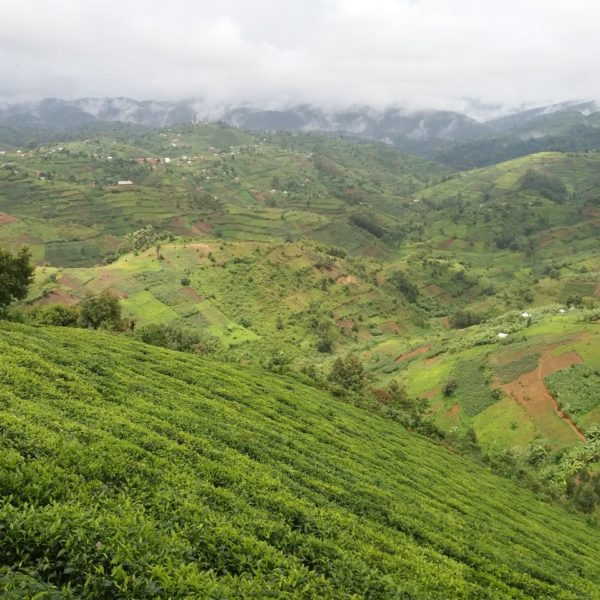
See orher tours

Central African Republic 10 days – the Green Heart of Africa,

Guinea, Liberia, Sierra Leone – 14 days

Libya – the jewel of North Africa – 7 days

Malawi, Zambia and the Democratic Republic of the Congo – 12/16 days

Yemen – Socotra Island 8 days

Turkmenistan – Legends of the Silk Road, – 8 days

Tajikistan – a Country of a Thousand Lakes – 12 days

The Democratic Republic of the Congo & Republic of the Congo – the Heart of Africa -15 days

Angola – Unexplored Africa – 10 days

Ghana, Benin, Togo – 12 days

Senegal Gambia Guinea-Bissau – the Gateway to Africa – 12/16 days

Iran – north-western part – 14 days

Iran – south-east – 10 days

Iran – Persian Classic – 12 days

Ivory Coast – 8 days

Nigeria – African Kaleidoscope – 12 days

Mauritania and Western Sahara – 9 days

Pakistan – a land of fairy tales on the roof of the world 14 days

Pakistan – Unknown History, 15 days

Uganda, Rwanda,Burundi, Democratic Republic of the Congo – Pearls of Africa, 14 days

Niger – Gerewol Festival 2024 – 11 days

Eritrea 7 days

South Sudan The Youngest Country of Africa – 12 days

Somalia – Mogadishu- 3 days

Niger – Mysteries of the Sahara 15 days

Djibouti-Somaliland – 9 days

Afghanistan – 10 days

Iraq and Kurdistan- between the Tigris and Euphrates – 15 days

- [email protected]
- +44 7850401072
Beyond The Path
- 18 Water Tower View, Chester CH2 3EA, Cheshire, UK A UK registered company
- Book a tour
- Check our calendar
- Destinations
- Create your own trip
Important infomations
- Booking Conditions
- Privacy policy
Copyright © 2019 BTP ADVENTURE / Made by : GiLDATA !
- Cooperation

Discover Cameroon
Between the mighty congo basin and the atlantic ocean lies a land of untainted equatorial rainforest where rare primates still roam, and local people pass on timeless skills in villages that are little changed for centuries., to roam through the wonderful landscape and to meet and befriend the deeply welcoming people of cameroon is an experience that totally immerses you in the rich and vibrant culture and leaves you awe-struck at the natural wonders that abound., from volcanic mountain ridges to broad, glassy rivers, from forest canopies that throb to the call of the rarest of species to golden sandy palm-fringed shores, this is a land which will steal your heart away., what to see on our cameroon group tours .
• Relish the verdant beauty of the Cameroon countryside • Meet the amazing peoples who call Cameroon home, including those of the Dja Reserve • Immerse yourself in the histories and traditions of the ancient chieftaincies • Finish the tour by the wonderful beaches of Kribi
Looking for a Private Tour?
Although many of our tours are small group adventures with set departures, as a bespoke operator, we can design and create trips to suit any traveller, from solos to larger groups. Most of our popular group tours are available on a private basis, allowing you the freedom to decide on when you would like to travel. Below we have given some sample pricing based on one or two people travelling. To find out more about organising this tour on a private basis, or arranging the perfect holiday tailored to your requirements get in touch with our well-travelled team. Contact us by phone or email. Kingdoms of Cameroon 15 Days Private Tour price based on one person travelling - from £6,300 15 Days Private Tour price based on two people travelling, sharing twin or double accommodation - from £3,850pp
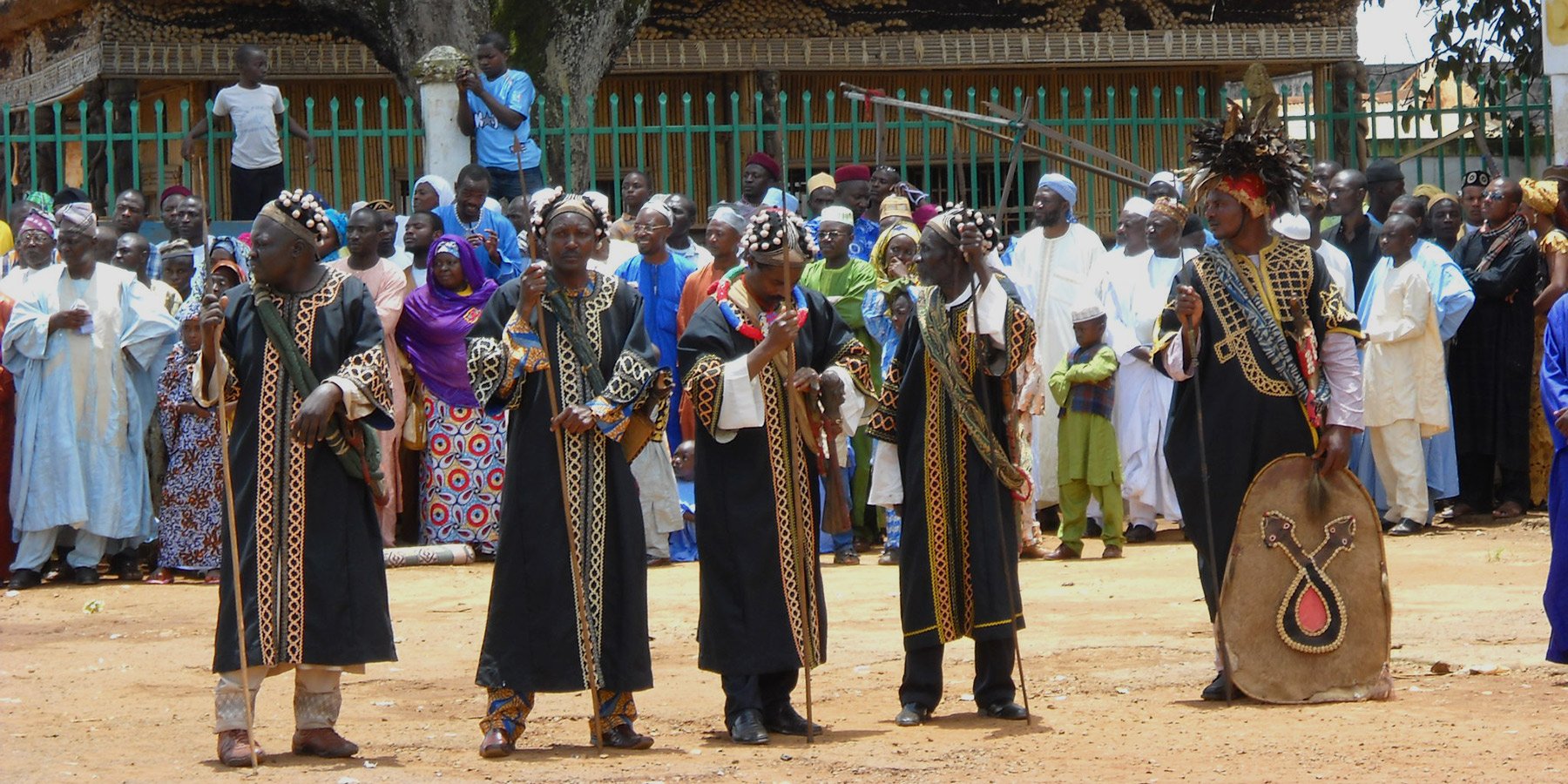
Cameroon Kingdoms of Cameroon
Small Group Tour 14 Days from £2,595
Feedback from our Travellers
The inquiry, and all subsequent communications with Undiscovered Destinations were handled in an exemplary fashion. An excellent local guide who did all that he could to make us feel welcome and to provide for our needs. We thought it was an excellent trip, the support from Undiscovered Destinations was excellent, and it is great to know that there are still reliable companies that can arrange tours to unusual and less well visited destinations.
Traveller from USA
Very Satisfied, You were extremely helpful when my flight was cancelled. Joseph worked tirelessly for us. A very nice man. Accommodation and hospitality with the Baaka was a wonderful experience. The hotel in Yaonde exceeded my expectations. This trip was a wonderful experience.
Angela Mayne, UK
Best Time to Visit
Cameroon spans the dense, lush forests in the south, to the far drier north, nudging up towards the Sahel. Rains fall across the country from May to October, with July onwards seeing the heaviest downpours.
Other Tours You May Like
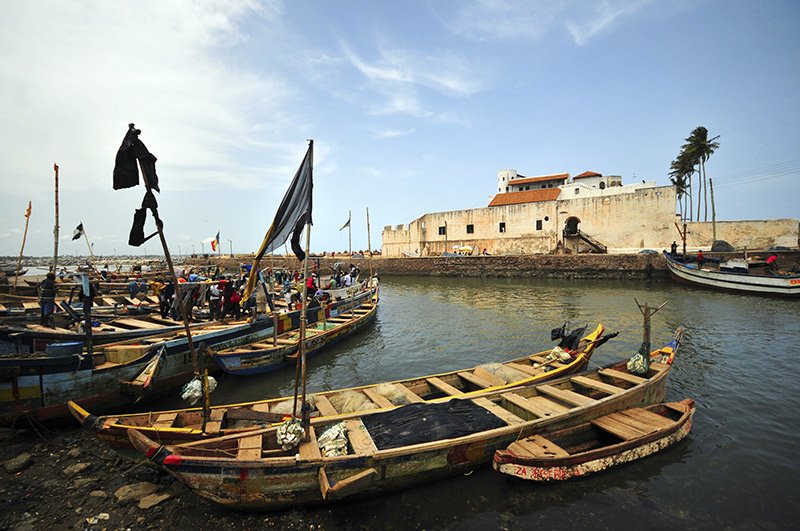
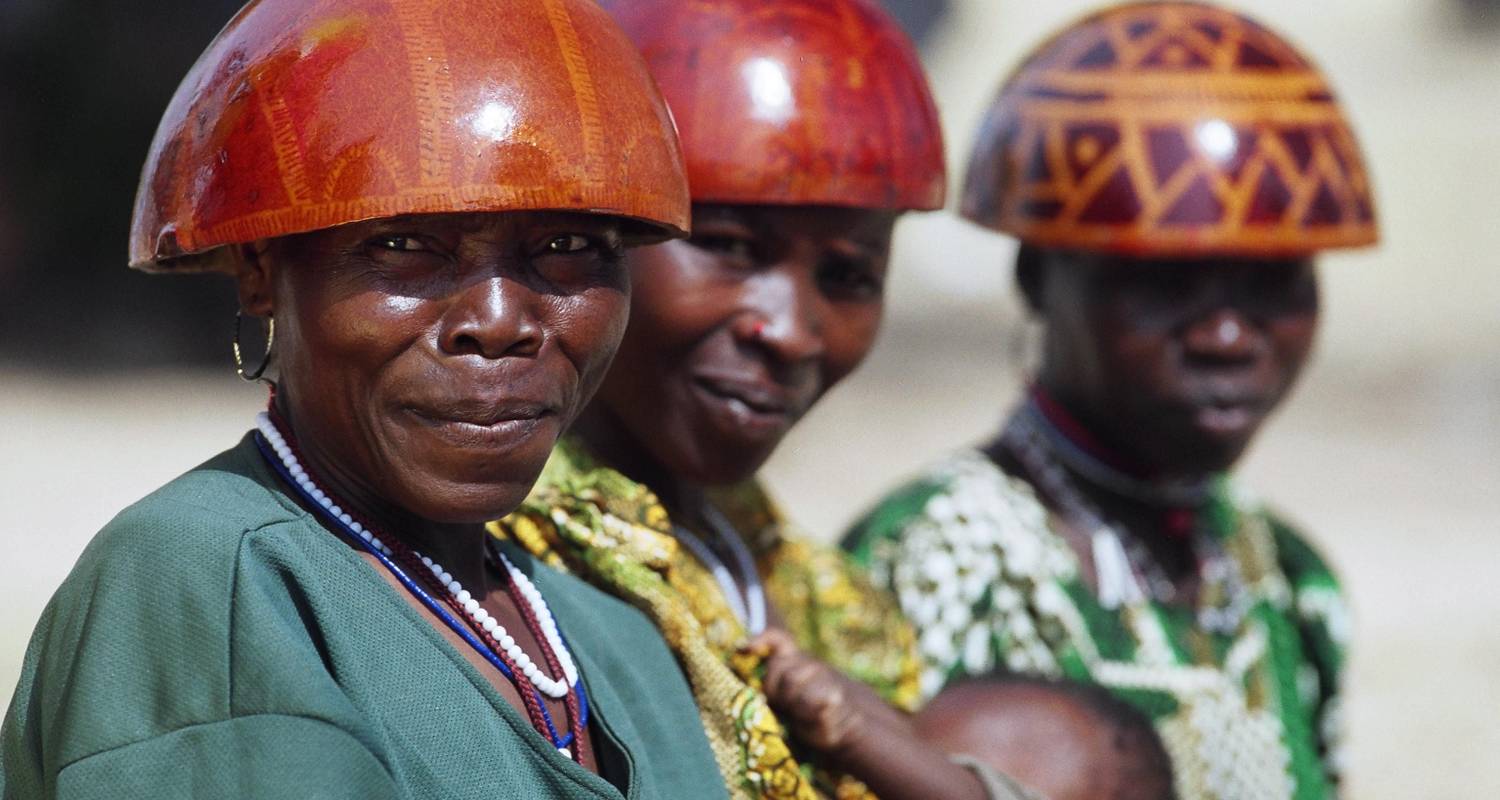
Cameroon Tours & Trips
- Choose from 7 Cameroon tours
- 24/7 customer support
Table of contents
The best Cameroon tour packages
Top operators in cameroon, contact our cameroon travel experts.
Compiled by

Nina Cameroon travel expert at TourRadar
The Dja Biodiversity Reserve Safari 7D/6N
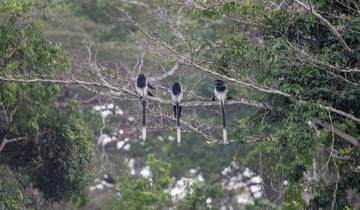
- Christmas & New Year
- Canoe back along the scenic River Dja
- Trek to Chouam Rock and camp under the stars
- Discover Yaoundé's cuisine on your final night
Lobéké National Park Express 11D/10N
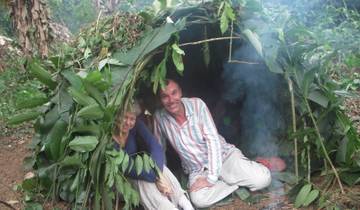
- Trek through Lobéké, spot exotic wildlife
- Explore Lomié and stay at Raphia Hotel
- Camp under stars, watch gorillas and elephants
Mout Cameroon Trekking Adventure 10D/9N
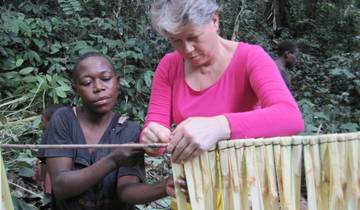
- Hiking & Trekking
- Trek through rainforests on Mount Cameroon
- Camp near volcanic craters and lunar landscapes
- Explore African city life and local crafts
Azobe East Adventure Safari 13D/12N
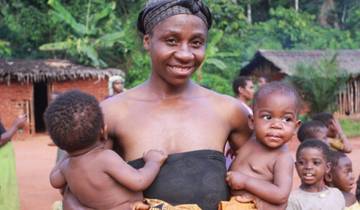
- Explore the Equatorial forest to Lomié
- Experience Pygmy village life and culture
- Watch gorillas and elephants from a watchtower
Cultural Tour of Cameroon - 7 Days
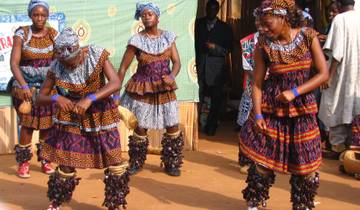
- In-depth Cultural
- Explore the chief's palace in Bandjoun
- Enjoy seafood at Limbe's Downbeach
- Visit Dschang's Musee de civilisation
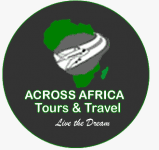
Across Africa Tours & Travel is an expert in:

Continent Tours is an expert in:

Its Your Trip is an expert in:

Expert in Cameroon at TourRadar
Joachim is one of our seasoned Cameroon Travel Experts. Reach out to us to get all your questions about Cameroon tours answered!
- Choose from 7+ Cameroon tours
Write us a message
Discover TourRadar

Welcome to Cameroon!
Green. lush. mt cameroon..
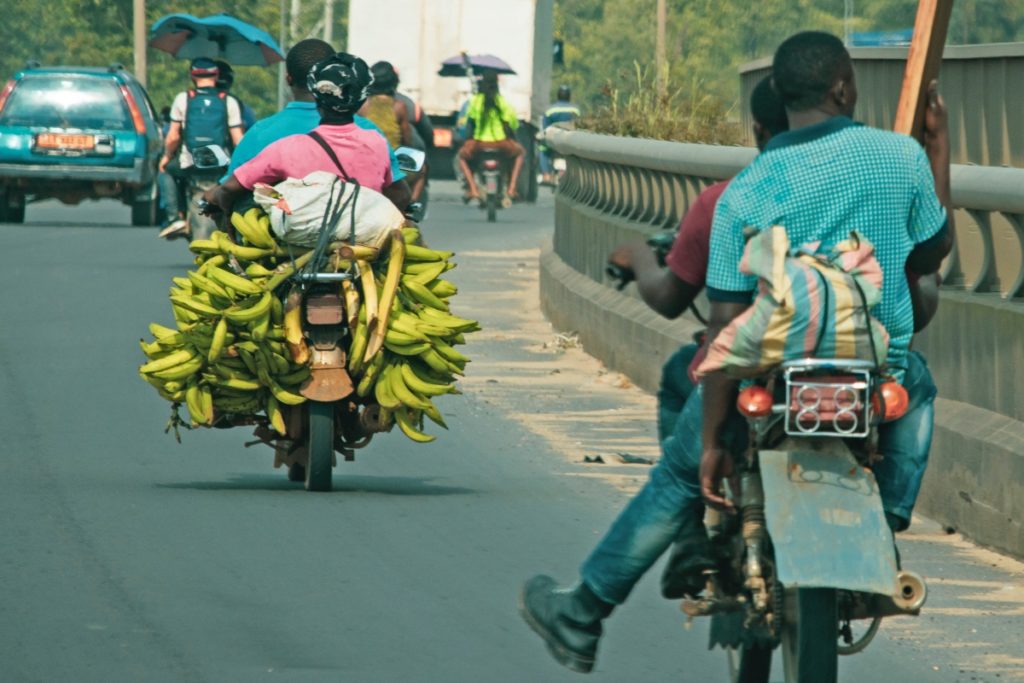
The climate of Cameroon is tropical, which means hot and humid weather and persistent rain. The upside of this is that Cameroon is very green and lush. A huge country both English and French-speaking regions, not to mention over 250 local languages also spoken here.
Getting around in Cameroon is quite easy and roads are reasonable, a lot easier to travel here than in many other parts of Africa. The people in Cameroon are friendly, easy-going and welcoming. Evenings in Cameroon are often spent outdoors in small eateries listening to African beats and drinking cold beer.
Find Cheap Flights to Cameroon
Find Accommodations in Cameroon
Rent a Cheap Car in Cameroon
Get Connected in Cameroon
Find Travel Insurance for Cameroon
View Group Tours in Cameroon
Find Things to do in Cameroon
Find Transport in Cameroon
Learn more about Cameroon
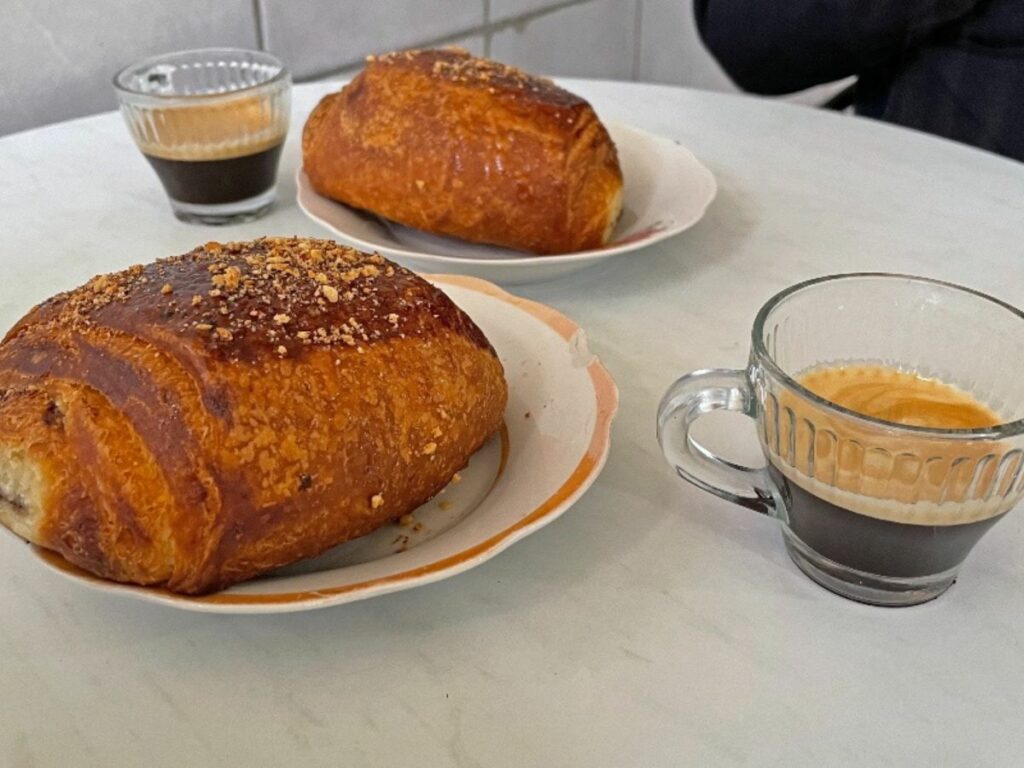
20 Popular Breakfast Foods in Africa
If you plan to travel to Africa, you may wonder what food you can expect to eat.
This post focuses solely on breakfast foods in Africa, the day’s most important meal! Is breakfast here sweet, savoury, light or heavy?
Read on to find out!
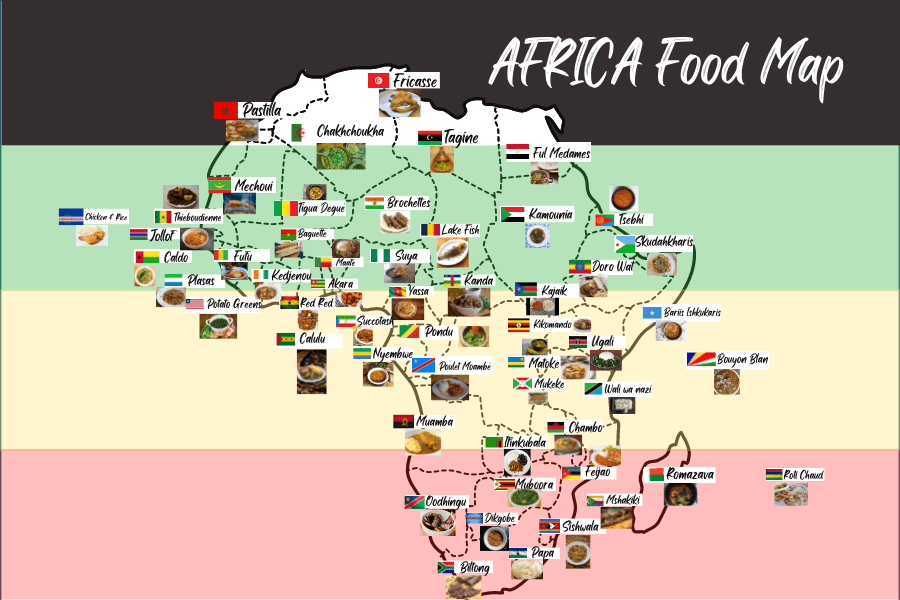
AFRICA Food Map – African Food Guide to 54 Countries
Africa is a huge continent made up of 54 different countries in total.
Our Africa Food Map covers the most popular African food eaten in each country.
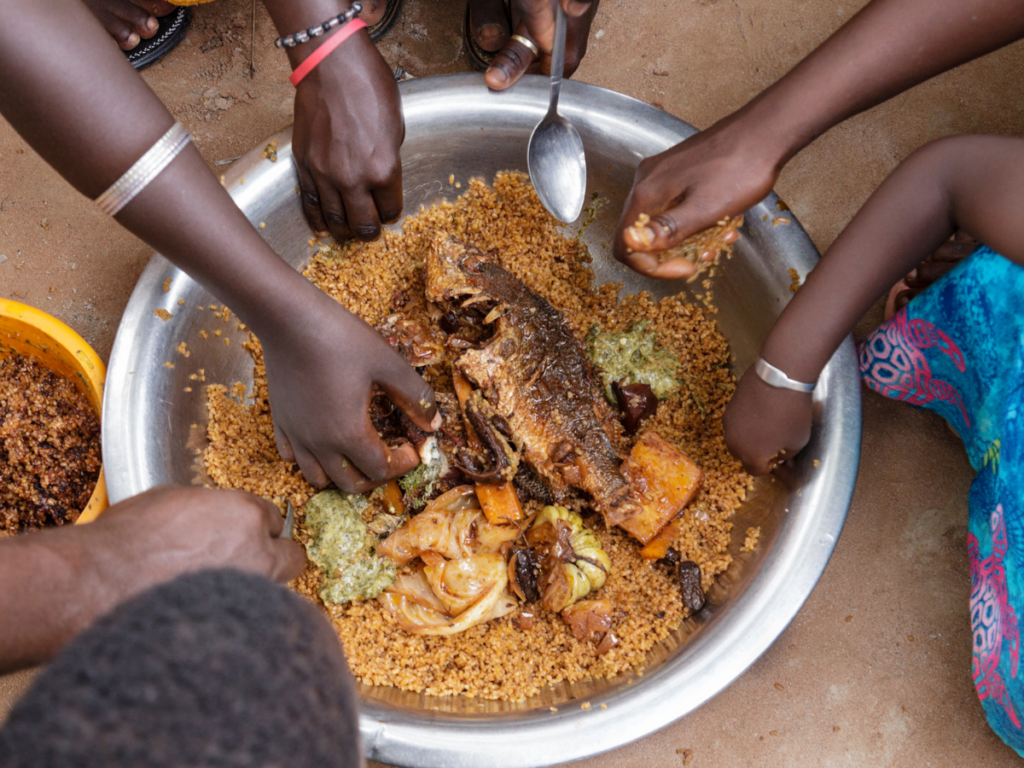
15 Most Popular Foods From Africa
From the savoury stews of East Africa to the delectable pastries of North Africa, the continent’s culinary landscape is as diverse as it is delicious, offering many gastronomic delights just waiting to be discovered.
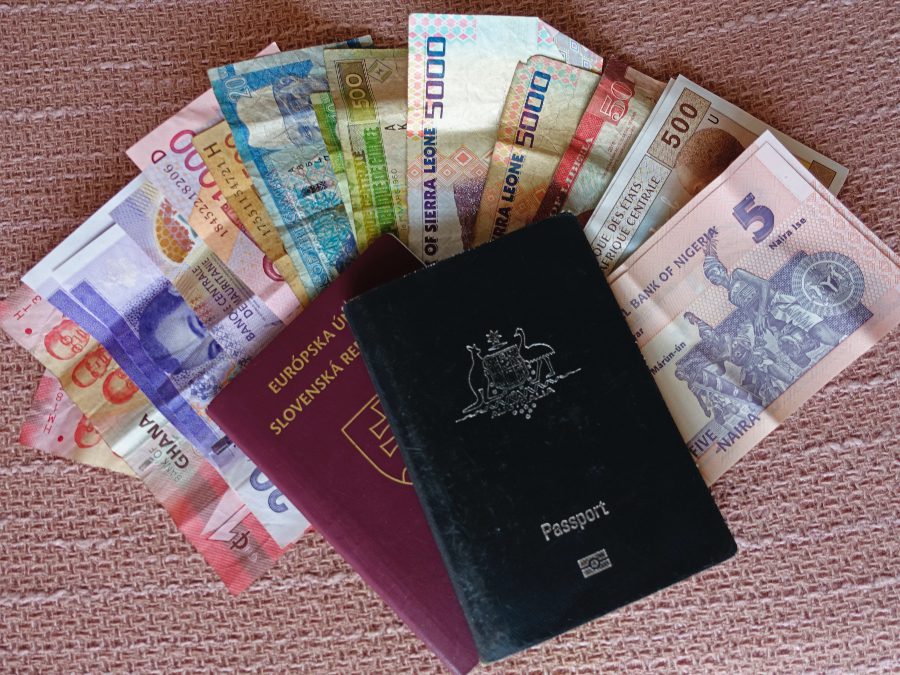
Travelling in Central Africa – Why are we moving faster?
Why are we travelling in Central Africa at a quicker pace than usual?
If you’ve been following our journey for a while, you might have noticed we are moving a little faster across Central Africa.
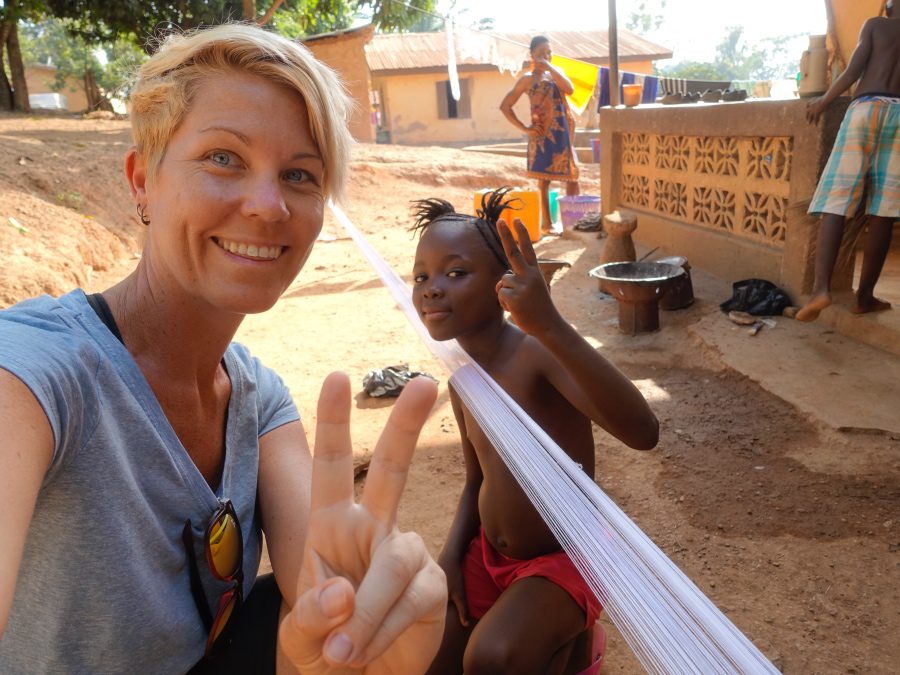
Travelling West Africa – Our INCREDIBLE Journey Recap in 2019
Should we go travelling West Africa? Why not?
There are 16 countries in this region and after spending several months here; we have a little recap for you from our crazy travels across this region of Africa.
Cookies on GOV.UK
We use some essential cookies to make this website work.
We’d like to set additional cookies to understand how you use GOV.UK, remember your settings and improve government services.
We also use cookies set by other sites to help us deliver content from their services.
You have accepted additional cookies. You can change your cookie settings at any time.
You have rejected additional cookies. You can change your cookie settings at any time.
Warnings and insurance
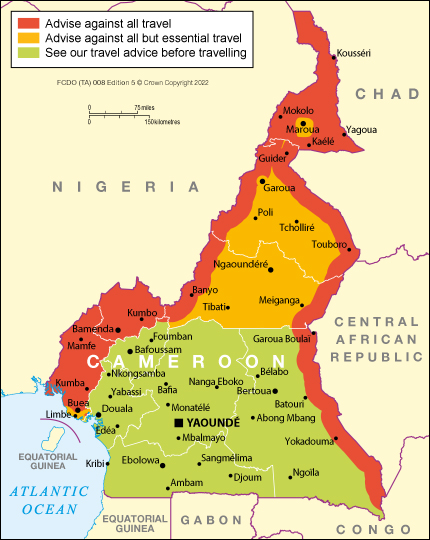
Your travel insurance could be invalidated if you travel against advice from the Foreign, Commonwealth & Development Office (FCDO).
Areas where FCDO advises against travel
Bakassi peninsula.
FCDO advises against all travel to Bakassi Peninsula.
Cameroon-Central African Republic border
FCDO advises against all travel to within 40km of the border with Central African Republic.
Cameroon-Chad border
FCDO advises against all travel to within 40km of the border with Chad.

Cameroon-Nigeria border
FCDO advises against all travel to within 40km of the border with Nigeria, except for Garoua in the North Region.
Far-North Region
FCDO advises against all travel to the Far-North Region, except for:
- a 20km radius to the north, east and west of Maroua
- 30km south of Maroua
North-West Region
FCDO advises against all travel to the North-West Region.
South-West Region
FCDO advises against all travel to the South-West Region, including the towns of Buea, Muyuka and Tiko in Fako Division. Except for:
- the 35km stretch of the N3 road connecting Limbé to the Littoral Region in Fako Division
FCDO advises against all but essential travel to Limbé and the 35km stretch of the N3 road connecting Limbé to the Littoral Region in Fako Division, South-West Region.
North Region, Adamawa Region and Maroua
FCDO advises against all but essential travel to the rest of North and Adamawa regions, including Garoua in North Region, and a 20km radius to the north, east and west of Maroua, and 30km south of Maroua, in Far-North Region.
Find out more about why FCDO advises against travel .
Support from the UK government
The British High Commission can only offer limited support for British nationals in areas where we advise against travel.
Before you travel
No travel can be guaranteed safe. Read all the advice in this guide. You may also find it helpful to:
- see general advice for women travellers
- read our guide on disability and travel abroad
- see general advice for LGBT+ travellers
- read about safety for solo and independent travel
- see advice on volunteering and adventure travel abroad
Travel insurance
If you choose to travel, research your destinations and get appropriate travel insurance . Insurance should cover your itinerary, planned activities and expenses in an emergency.
About FCDO travel advice
FCDO provides advice about risks of travel to help you make informed decisions. Find out more about FCDO travel advice .
Follow and contact FCDO travel on Twitter , Facebook and Instagram . You can also sign up to get email notifications when this advice is updated.
Related content
Is this page useful.
- Yes this page is useful
- No this page is not useful
Help us improve GOV.UK
Don’t include personal or financial information like your National Insurance number or credit card details.
To help us improve GOV.UK, we’d like to know more about your visit today. Please fill in this survey (opens in a new tab) .
A first-time guide to Cameroon
Jun 25, 2024 • 7 min read

Get to know Cameroon with this guide for first-time visitors © Studio Kurakame / Getty Images
Cameroon is the perfect place to get a taste of one of Africa’s least-known, yet most rewarding corners.
As a natural realm, it spans so many worlds: forests rich in primates and other wildlife, tropical beaches watched over by a volcano, highlands animated by traditional villages and cultures. This steamy place has swagger, a joyous musical soundtrack, and a culinary story with hot, colorful sauces atop local fresh ingredients.
When should I visit Cameroon?
Because it is one of the continent's lesser-visited countries, questions of when to go inevitably revolve around the weather rather than picking an offseason time to avoid crowds.
If you really want to see the country at its best, the months from November to February are the driest with daily temperatures rarely dipping below 28ºC (82ºF). This is excellent beach weather with warm and balmy conditions that are really rather pleasant.
If you leave your visit until March, you might be too late. Once the rains arrive – usually sometime in March, but very much in earnest in April – they can really set in and don’t stop until September or October. And when it’s not raining, it’s uncomfortably sticky and humid (sometimes as high as 90% for days in a row), and country roads become impassable. Avoid the large coastal city of Douala, at this time, and head instead for the cooler hills of Yaoundé (or the beach).

How many days do I need in Cameroon?
At first, Cameroon can be in-your-face: the noise and the clamor, the market smells and the humidity. But the longer you stay, the more you’ll fall in love (and want to stay longer).
Two weeks is probably a minimum trip duration here. Factor in a couple of days to acclimatize, and plan to spend at least a few days in each destination, not least because distances can be longer than many travelers imagine. Things rarely happen quickly, especially in rural areas – it would be a shame to miss out on seeing those nesting turtles because you didn’t allow enough time for everything to unfold.
And, of course, you can (and should) lie on the beach for as long as you want.
What languages are spoken?
Many different languages are spoken across Cameroon, but both French and English are the official languages. French is more widely spoken and understood outside of anglophone areas.
Is it easy to get in and around Cameroon?
As of 2023, Cameroon became a whole lot easier to visit. While neighboring countries cling to the Central African obsession with physical forms in triplicate, multiple passport photos, and in-person visits to embassies, Cameroon has done away with all that. Now you can lodge your application for an e-visa online at evisacam.cm , and pick up your visa on arrival.
Once you’re in the country, getting around is similarly hassle-free. Before leaving home, check the travel advisories for Cameroon to make sure you understand where travel is not recommended. That sorted, Cameroon has an excellent network of roads and most of these are plied by modern buses.
Beyond Kribi along the southern coast, however, or anywhere up-country in the north or east, paved roads peter out into the forest and shared taxis (very slowly) connect villages. And a whole new adventure begins.

Top things to do in Cameroon
There’s so much to see and do in Cameroon that a visit here requires careful planning. Then again, you could always come back for a second visit and do all the things you missed the first time around…
Visit the home of the chief
Cameroon’s South-West has long been considered a bastion of tradition. While parts of the region currently have travel advisories, Foumban’s Palais Royal is very much open to travelers. The palace, itself an arresting architectural structure that combines local traditional styles with German colonial architecture, has priceless treasures such as intricate woodcarvings, feathered cloaks and a ceremonial drum that belong to the still-extant Bamoun dynasty, now into its 20th hereditary sultan. Just 86km (53 miles) down the road in Bandjoun, another palace is more purely African in its conception, and every bit as fascinating.

Relax on the beaches of Kribi or Limbe
Kribi lies along Cameroon's south coast, and the beaches south of town are some of Africa's loveliest. The only reason that the beaches of Kribi (or further north around Limbe) don’t make lists of the world’s best beaches, is that very few people even know that they exist. Limbe in particular involves arcs of (sometimes chocolate-colored) sand against a backdrop of rainforests and the cloud-high summit of Mt Cameroon. Otherwise, Cameroon’s beaches are that dreamy mix of palms, fishing villages and very few resorts or people. Bliss is an understatement.
See a waterfall plunge straight into the sea
Chutes de la Lobé is a waterfall that empties right into the ocean 7km (4 miles) south of Kribi; local tour operators and hotels run half-day trips to the falls, with a picnic lunch on the beach.
Climb Mt Cameroon
Hire a local guide and hike up into the cloud forests of West Africa’s highest mountain. Everything you spend on the mountain (such as guide or porter fees) goes back into the 12 villages that cling to this dormant volcano’s foothills. From the summit, 4040m (13,255ft) above sea level (the ocean’s shore is at Buea, alongside the mountain’s base), the views are extraordinary, as the bare lava slopes yield to rainforest. You can even see the Equatorial Guinean island of Bioko out to sea.
Visit the sea turtles of Ebodjé
Few travelers make it as far as Kribi and even fewer reach Ebodjé. This means that you might get the opportunity to walk along a pristine, deserted beach and enjoy the sight of nesting sea turtles, and have it all to yourself. Surely one of the most underrated wildlife experiences in Africa, these walks by local ecotourism outfits are low-key and help to promote the conservation of leatherback turtles, the world’s largest surviving turtle species. Tread softly and watch with wide-eyed wonder.

My favorite thing to do in Cameroon
I’ve been visiting Cameroon since 2000 and there’s so much to love – the national parks in the north and east, the forests and sea turtles of the southern beaches, the deeply traditional cultures that still worship nature and their ancestors in the South-West.
But most of these specific attractions have one thing in common: they all occur beyond where the paved road ends. This is a country where ancient cultures, unsullied by mass tourism or overdevelopment, still hold sway out in the rural backcountry. It’s those encounters – talking with villagers for hours in the shade of a mango tree, watching and waiting as sea turtles inch their way up the beach while the sun sets, closing my eyes and listening to the sounds and biorhythms of the forest with not a single engine within earshot. That’s the Cameroon I miss most when I’m away.
How much money do I need for Cameroon?
Cameroon uses the Central African franc (CFA), which is also the currency of five of Cameroon’s near neighbors. The value of the CFA is tied to the euro (at an unchanging rate of CFA655.957).
Paying by credit card is only possible in high-end international establishments – bring plenty of euros or US dollars, and do so in a mix of high- and low-denomination notes.
Cameroon is, in most cases, moderately priced, but prices skyrocket in restaurants, shops and hotels frequented by expats. Sample prices include:
- Hotel room: $30–350
- Hiring a taxi for a short, cross-town trip/day: $10/150
- Street food ( riz sauce /rice with sauce): $2
- Dinner for two (three courses) in an upmarket restaurant: $80
- Pint of beer/Guinness at the bar: $3/5
Things you should know about Cameroon
Is cameroon safe.
Most travel advisories from Western governments warn against traveling to some parts of the country: much of the Anglophone South-West, the Extreme North, and the country’s eastern boundaries. On their websites, most such advisories have maps of where not to travel. Remember that if you ignore this advice, you may not be covered by your travel insurance. Watch out for pickpockets (and always take a taxi after dark) in larger cities.
Make flexible travel plans
Not everything always goes according to plan, with delayed transport departures, extreme weather and poor road conditions in rural areas all possible. Build extra time into your schedule so delays or inexplicable cancellations aren't so important. You might even end up in a memorable conversation with locals or otherwise discover the benefits of slowing down to a very different travel rhythm. Being patient and calm, and surrendering your time to the vagaries of travel Cameroonian-style, will almost always bring its own rewards.
Explore related stories

Destination Practicalities
Dec 5, 2023 • 4 min read
From the vacation of a lifetime to the life of a digital nomad, we've got everything you need to know about entry requirements for Panama.

Sep 6, 2024 • 7 min read

Sep 8, 2024 • 5 min read

Sep 9, 2024 • 4 min read

Sep 9, 2024 • 5 min read

Sep 7, 2024 • 14 min read

ORTON TRAVEL TOUR – Reference Travel Agency in Cameroon
Welcome to Orton Travel Tour , your reference tourism and travel agency in Cameroon made up of a team of bilingual tourism professionals. Its main objective is "total satisfaction of its customers" : Excellence is what we provide .
We sell several tourist destinations in the world from Africa, Asia to the Middle East for your holidays.
Trust Orton Travel Tour and you will be satisfied!
Are you looking for a short leisure trip within Cameroon?
OUR EXCURSION OFFERS
Make your choice without delay.
"Kribi la belle", home to numerous golden sand beaches and the magnificent lobe waterfalls, with a height of about 20 meters falling directly into the Atlantic ...
The force of this waterfall is magical, as you go closer by descending the stairs, you hear the heavy sound as the waters fall on the rock. The falls are seasonal as they are ....
It is an adventure into nature. The river is black and calm, very silent such that you can hear every dive in the river by the fishes, and the sound of the leaves as the ...
Before the arrival of the Europeans on the Cameroon coastlands, there was Joseph Merrick, the Jamaican Evangelist, who had visited and stationed on the shores of...
This mountain has numerous appellations, some call it “the chariots of god”, referring to the accounts of Hanno the Carthaginian who visited and saw the eruption...
Siga-Bonjo is one of the six villages in Canton Wouri-Bwele, in the Nkam Division of the Littoral Region. It’s a tourist destination with natural, cultural and artistic potentials that regroups the 5As ....
It is a river island on the Wouri Estuary in the Littoral Region. It is administratively attached to Bonaberi, and access to Jebale Island are from Bonassama with about 15 minutes canoe ride from ...
If you need to breathe the air filtered by the wild forest with its gigantic trees on the mountains that surround the village, come to NKOLANDOM....
CURRENT EVENT
Explore orton's latest blogs, the airlines in cameroon, flight travel in cameroon finally getting busy, flight resumption in cameroon, beach trip to kribi – relax with music, kribi beach, cameroon [2020] – beach excursion, beach football, kid-friendly beach excursion, beri plans to visit kenya, ngwe’s online ticket, long – haul flights.
Our Partners
FLIGHT TICKETS
HOTEL BOOKING
- Travel Advisories |
- Contact Us |
- MyTravelGov |
Find U.S. Embassies & Consulates
Travel.state.gov, congressional liaison, special issuance agency, u.s. passports, international travel, intercountry adoption, international parental child abduction, records and authentications, popular links, travel advisories, mytravelgov, stay connected, legal resources, legal information, info for u.s. law enforcement, replace or certify documents.
Before You Go
Learn About Your Destination
While Abroad
Emergencies
Share this page:
Travel Advisory July 31, 2023
Cameroon - level 2: exercise increased caution.
Reissued with obsolete COVID-19 page links removed.
Exercise increased caution in Cameroon due to crime . Some areas have increased risk. Read the entire Travel Advisory.
Do Not Travel to:
- North, Far North, Northwest and Southwest Regions, and Parts of East and Adamawa Regions due to crime and kidnapping.
- Far North Region due to terrorism.
- Northwest and Southwest Regions due to armed violence, crime, and kidnapping .
Country Summary: Violent crime, such as armed robbery and carjacking, is common throughout Cameroon. Local police lack the resources to respond effectively to serious criminal incidents.
The U.S. government has limited ability to provide emergency services to U.S. citizens in North, Far North, Northwest, Southwest, and Parts of Adamawa and East Regions of Cameroon due to current official travel restrictions.
Read the country information page for additional information on travel to Cameroon.
If you decide to travel to Cameroon:
- Do not display signs of wealth, such as expensive watches, handbags, or jewelry.
- Monitor local media for breaking events and be prepared to adjust your plans.
- Enroll in the Smart Traveler Enrollment Program ( STEP ) to receive important information from the Embassy about safety conditions in your destination country, help the Embassy contact you in an emergency, and help family and friends get in touch with you in an emergency.
- Follow the Department of State on Facebook and Twitter .
- Review the Country Security Report for Cameroon.
- Prepare a contingency plan for emergency situations. Review the Traveler’s Checklist .
- Visit the CDC page for the latest Travel Health Information related to your travel.
North, Far North, Northwest and Southwest Regions, and parts of East and Adamawa Regions – Level 4: Do Not Travel
Violent crime, including kidnapping by terrorists and/or kidnapping for ransom, armed robbery, assault, and carjacking are serious concerns in Cameroon, especially in all these regions.
In the Adamawa Region north of the capital, Ngaoundere, and East Regions, there is a heightened criminal threat within 20 kilometers of the border with the Central African Republic.
Visit our website for Travel to High-Risk Areas .
Far North Region– Level 4: Do Not Travel
In the Far North Region, terrorists may attack with no warning, targeting local facilities and places frequented by Westerners.
Northwest and Southwest Regions – Level 4: Do Not Travel
In Northwest and Southwest Regions, armed clashes between separatists and government forces, and other acts of violence, including violent criminality, kidnapping for ransom, sexual assault, arson, roadside ambushes and robberies, use of improvised explosive devices, illegitimate detentions, and murder have occurred. Security force operations, imposed curfews and movement restrictions, and attacks by armed militants regularly take place throughout these regions, including in major cities. Ongoing violence has led to a breakdown in order and a significant decline in public services, including medical resources in large areas of both regions.
Embassy Messages
View Alerts and Messages Archive
Quick Facts
Six months
One page per stamp
- Yellow fever
While there are no official restrictions, travelers are required to make a declaration when they are exiting with XAF 3,000,000 or more.
Embassies and Consulates
U.s. embassy yaounde.
Avenue Rosa Parks (in the Mbankolo Quartier, adjacent to the Mount Febe Golf Club) P.O. Box 817 Yaounde, Cameroon
Telephone: +(237) 22220-1500 Monday through Thursday, 7:30 a.m. to 5:00 p.m. and Friday, 7:30 a.m. to 12:30 p.m.
Emergency After-Hours Telephone: +(237) 22220-1500
Fax: +(237) 22220-1572
Destination Description
Learn about the U.S. relationship to countries around the world.
Entry, Exit and Visa Requirements
Requirements for Entry:
- Current immunization records, including evidence of yellow fever vaccination are required for entry into Cameroon.
- World Health Organization (WHO) card with yellow fever vaccination.
- Proof of polio vaccination for visits longer than four weeks.
Visas: Obtain your visa before traveling. Visit the Embassy of Cameroon website for the most current visa information.
Dual Nationality: Cameroon does not recognize dual nationality. U.S. citizens should always present themselves as U.S. citizens to Cameroonian authorities, regardless of their country of birth. U.S. citizens must always enter and exit Cameroon on a U.S. passport with a valid Cameroonian visa otherwise they are liable to be denied entry or detained. Furthermore, presenting oneself as a Cameroonian citizen may impede our ability to provide consular services.
The U.S. Department of State is unaware of any HIV/AIDS entry restrictions for visitors or foreign residents of Cameroon.
Find information on dual nationality , prevention of international child abduction and customs regulations on our websites.
Safety and Security
Terrorism: Terrorist groups and those inspired by such organizations are intent on attacking U.S. citizens abroad. Terrorists are increasingly using less sophisticated methods of attack – including knives, firearms, and vehicles – to more effectively target crowds. Frequently, their aim is unprotected or vulnerable targets, such as:
- High-profile public events (sporting contests, political rallies, demonstrations, holiday events, celebratory gatherings, etc.)
- Hotels, clubs, and restaurants frequented by tourists
- Places of worship
- Shopping malls and markets
- Public transportation systems (including subways, buses, trains, and scheduled commercial flights)
Boko Haram and ISIS-West Africa are active in Far North, North, and Adamawa Regions of Cameroon. Suicide bombings have occurred in public places in and around urban areas resulting in numerous deaths and injuries. Terrorist attacks are most common outside major towns, especially in the regions bordering Nigeria and Chad . Extremists have frequently target areas of congregation, particularly camps for refugees and internally displaced persons (IDPs). While most victims of terrorist attacks in Cameroon have been locals, violent extremist organizations may seek to target Westerners or conduct other high-profile operations. Kidnapping by terrorist organizations remains a concern. Refrain from traveling outside of cities or towns after dark and exercise caution when in the vicinity of potential targets.
There is ongoing violence in Northwest and Southwest Cameroon. Security force operations and attacks by armed militants regularly take place throughout these Regions including in major cities. Neighboring areas of other regions are at risk of spillover violence, including Douala. Use of improvised explosives and incendiary devices, kidnappings, illegitimate detentions, and acts of violent criminality by armed actors have also occurred in Northwest and Southwest Cameroon. Security forces, government officials, road travelers, administrative buildings, schools, and commercial areas have been repeatedly attacked. Those suspected of being associated, even tangentially, with the central government or armed militants have been targeted for reprisals by a variety of elements.
Border Areas : Cameroon’s borders remain porous. Terrorists regularly cross the border into Cameroon from Nigeria and Chad to conduct attacks in the Far North, North, and Adamawa Regions. Militant activities and security operations routinely occur along Cameroon’s shared border with Nigeria in the Northwest and Southwest Regions. Armed criminals and communal militia frequently conduct attacks in border areas abutting the Central African Republic (CAR).
Embassy personnel are restricted from traveling to the Northwest, Southwest, North, and Far North Regions of Cameroon, as well as within 20 kilometers of the border with the Central African Republic in Adamawa and East Regions, and within 20 kilometers of the border with Nigeria and north of Ngaoudere in the Adamawa Region.
Bakassi Peninsula: Cameroon's military authorities restrict access to the Bakassi Peninsula. U.S. citizens should avoid this area.
Use of Improvised Explosive Devices : Multiple improvised explosive device (IED) attacks have occurred in Douala and Yaoundé since June 2020. The threat for similar attacks could take place countrywide. Various armed actors, to include terrorists and political militants, may use such devices. To date, recent IED incidents have not directly targeted U.S. citizens or areas frequented by Westerners, however the risk of wrong place/wrong time violence remains. Locations with a high security force or government presence may be at increased risk of being targeted.
For more information, see our Terrorism page.
Crime: Violent and opportunistic crime is prevalent throughout the country including major cities. Foreigners in Cameroon have been victims of all types of crime including murder, sexual assault, kidnapping, carjacking, burglary, theft, armed robbery, and home invasion. Criminals often employ violence, particularly in instances where victims attempt to resist. The risk of street and residential crime is especially high, even in affluent areas with a large police and private security presence.
Transport Crimes: U.S. Embassy personnel are prohibited from using taxis. Violent assaults on taxi passengers are common. Petty theft is prevalent, particularly on trains, buses, and taxis.
The Hilton and Mont Febe hotels offer a shuttle service from Yaoundé-Nsimalen Airport to downtown Yaoundé. Travelers are encouraged to use this service or retain the services of a reputable private transport company.
- Avoid walking alone especially after dark.
- Do not display cash and valuables.
- Drive with doors locked and windows closed.
- Always carry a copy of your U.S. passport and visa (if applicable). Keep original documents in a secure location.
Demonstrations occur frequently. They may take place in response to political or economic issues, on politically significant holidays, and during international events.
- Even demonstrations intended to be peaceful can turn confrontational and possibly become violent.
- Avoid areas around protests and demonstrations.
- Check local media for updates and traffic advisories.
Maritime Security : Piracy and armed robbery continue to increase throughout the Gulf of Guinea including Cameroon’s waters. Pirates and armed groups operating in the region typically carry out attacks on vessels using automatic weapons. Attacks, kidnappings for ransom, and robbery of crew, passengers, and ship’s property are common and may occur near coastal areas or deep waters. More information on current conditions may be found on the Office of Naval Intelligence’s piracy page.
Communications: During periods of heightened unrest or insecurity, there is a heightened risk of communications disruptions which may affect internet access, social media, mobile messaging, and cellular voice calls. These disruptions may be localized or countrywide.
International Financial Scams: See the Department of State and the FBI pages for information.
- Internet romance and financial scams are prevalent in Cameroon. Scams are often initiated through Internet postings/profiles or by unsolicited emails and letters. Scammers almost always pose as U.S. citizens who have no one else to turn to for help. Common scams include:
- Romance/online dating
- Financial transactions/money transfers
- Too good to be true purchases or sales
- Contracts with promises of large commissions
- Inheritance notices
- Work permits/job offers
U.S. citizen victims of sexual assault are encouraged to contact the U.S. Embassy for assistance. Report crimes to the local police by calling 117 and contact the U.S. Embassy at + (237) 22220-1500. Dial + (237) 22222-2525 in Yaoundé or dial 112 in major cities to contact ambulance services. If you have been a victim of sexual assault or rape, consider contacting a medical provider for HIV post-exposure prophylaxis.
Remember that local authorities are responsible for investigating and prosecuting crime.
See our webpage on help for U.S. victims of crime overseas .
- Help you find appropriate medical care
- Assist you in reporting a crime to the police
- Contact relatives or friends with your written consent
- Provide general information regarding the victim’s role during the local investigation and following its conclusion
- Provide a list of local attorneys
- Provide our information on victim’s compensation programs in the U.S.
- Provide an emergency loan for repatriation to the United States and/or limited medical support in cases of destitution
- Help you find accommodation and arrange flights home
- Replace a stolen or lost passport
Domestic Violence: U.S. citizen victims of domestic violence are encouraged to contact the Embassy for assistance.
Victims of Crime: Tourism: The tourism industry is unevenly regulated, and safety inspections for equipment and facilities do not commonly occur. Hazardous areas/activities are not always identified with appropriate signage, and staff may not be trained or certified either by the host government or by recognized authorities in the field. In the event of an injury, appropriate medical treatment is typically available only in Douala and Yaoundé. First responders are generally unable to access areas outside of these two cities and to provide urgent medical treatment. U.S. citizens are encouraged to purchase medical evacuation insurance .
Local Laws & Special Circumstances
Criminal Penalties: You are subject to local laws. If you violate local laws, even unknowingly, you may be expelled, arrested, or imprisoned. Individuals establishing a business or practicing a profession that requires additional permits or licensing should seek information from the competent local authorities, prior to practicing or operating a business.
You may be taken in for questioning by the police if unable to produce an acceptable form of identification, travel permit, or Cameroonian driver’s license.
Furthermore, some laws are also prosecutable in the United States, regardless of local law. For examples, see our website on crimes against minors abroad and the Department of Justice website.
Photography: It is illegal to take pictures of government buildings, military installations, and other public facilities, many of which are unmarked. You could be fined, have your photographic equipment confiscated, or be detained or arrested. Do not take photos of people without their permission.
Arrest Notification: If you are arrested or detained, ask police or prison officials to notify the U.S. Embassy immediately. See our webpage for further information.
Phone Service: Cellular phones are the norm, as other telephone service is unreliable and landlines are nearly non-existent. It may be possible to purchase a SIM card locally and use a U.S.-compatible cell phone. You will need to show your passport.
Currency: The Central African franc (XAF) is the official currency of Cameroon, but U.S. dollars and Euros are accepted in urban areas. Cameroon is primarily a cash economy. Due to the potential for fraud and other criminal activity, avoid using credit cards and be cautious when using ATMs. Exchange currency only at reputable banks. Money transfer services are found throughout the country.
Customs: Strict import and export regulations, particularly with regard to pharmaceuticals and wood products, are enforced. It is illegal to buy, sell, kill, or capture any protected wild animal or trade its parts without a license, including ivory. Cameroon is a signatory to the Convention on International Trade in Endangered Species. You will be prosecuted and could receive a prison sentence or a fine if you buy or traffic in these goods.
Wild Animal Parks: Heed all instructions given by guides or trackers. Use common sense and maintain a safe distance around wildlife. Even in the most serene settings, wild animals pose a lethal threat. There have been reports of armed poachers attacking tourists.
Counterfeit and Pirated Goods: Although counterfeit and pirated goods are prevalent in many countries, they may still be illegal according to local laws. You may also pay fines or have to give them up if you bring them back to the United States. See the U.S. Department of Justice website for more information.
Faith-Based Travelers: See the following webpages for details:
- Faith-Based Travel Information
- nternational Religious Freedom Report – see country reports
- Human Rights Report – see country reports
- Hajj Fact Sheet for Travelers
- Best Practices for Volunteering Abroad
LGBTI Travelers: Consensual same-sex sexual activity is illegal and punishable by a prison sentence of six months to five years and a fine ranging from 20,000 to 200,000 CFA francs ($35-$353). LGBTI individuals face social stigmatization, harassment, and discrimination. Police and civilians may extort money from presumed LGBTI individuals with the threat of exposure or arrest. Suspected members of the LGBTI community have received anonymous threats by phone, text, and email.
See our LGBTI Travel Information page and section 6 of our Human Rights report for further details.
Students: See our Students Abroad page and FBI travel tips .
Women Travelers: See our travel tips for Women Travelers .
For emergency services in Cameroon, dial the number of the hospital in the area where you are located. There is currently no national number for general health-related emergencies in the country.
Ambulance services are:
- Not widely available and training and availability of emergency responders may be below U.S. standards.
- Not present throughout the country or are unreliable in most areas except Yaoundé and Douala.
- Not equipped with state-of-the-art medical equipment.
- Not staffed with trained paramedics and often have little or no medical equipment.
Injured or seriously ill travelers may prefer to take a taxi or private vehicle to the nearest major hospital rather than wait for an ambulance.
We do not pay medical bills. Be aware that U.S. Medicare/Medicaid does not apply overseas. Most hospitals and doctors overseas do not accept U.S. health insurance.
Medical Insurance: Make sure your health insurance plan provides coverage overseas. Most care providers overseas only accept cash payments. See our webpage for more information on insurance coverage overseas. Visit the U.S. Centers for Disease Control and Prevention for more information on type of insurance you should consider before you travel overseas.
We strongly recommend supplemental insurance to cover medical evacuation.
Always carry your prescription medication in original packaging, along with your doctor’s prescription. Check with the government of Cameroon to ensure the medication is legal in Cameroon.
Vaccinations: Be up-to-date on all vaccinations recommended by the U.S. Centers for Disease Control and Prevention.
Further health information:
- World Health Organization
- U.S. Centers for Disease Control and Prevention (CDC)
The U.S. Embassy maintains a list of doctors and hospitals available on this page under "local resources." We do not endorse or recommend any specific medical provider or clinic.
Health facilities in general:
- Health care in many areas may be below U.S. standards.
- Public medical clinics may lack basic resources and supplies.
- Hospitals and doctors may require payment “up front” prior to service or admission. Credit card payment is not always available. Most hospitals and medical professionals require cash payment.
- Medical staff may communicate primarily in French and speak little or no English.
- Generally, in public hospitals only minimal staff is available overnight in non-emergency wards. Consider hiring a private nurse if the hospital is amenable or having family spend the night with the patient, especially a minor child.
- Patients bear all costs for transfer to or between hospitals.
- Psychological and psychiatric services are limited, even in the larger cities, with hospital-based care only available through government institutions.
Medical Tourism and Elective Surgery
- Medical tourism is a rapidly growing industry. People seeking health care overseas should understand that medical systems operate differently from those in the United States and are not subject to the same rules and regulations. Anyone interested in traveling for medical purposes should consult with their local physician before traveling and visit the U.S. Centers for Disease Control and Prevention website for more information on Medical Tourism.
- We strongly recommend supplemental insurance to cover medical evacuation in the event of unforeseen medical complications.
- Your legal options in case of malpractice are very limited in Cameroon.
- Although Cameroon has elective/cosmetic surgery facilities, the quality of care varies widely. If you plan to undergo surgery in Cameroon, make sure that emergency medical facilities are available, and professionals are accredited and qualified.
- Persons traveling to Cameroon for medical purposes require the proper “medical” visa. Check the Government of Cameroon’s website for more information.
Pharmaceuticals
- Exercise caution when purchasing medication overseas. Pharmaceuticals, both over the counter and requiring prescription in the United States, are often readily available for purchase with little controls. Counterfeit medication is common and may prove to be ineffective, the wrong strength, or contain dangerous ingredients. Medication should be purchased in consultation with a medical professional and from reputable establishments.
- U.S. Customs and Border Protection and the Food and Drug Administration are responsible for rules governing the transport of medication back to the United States. Medication purchased abroad must meet their requirements to be legally brought back into the United States. Medication should be for personal use and must be approved for usage in the United States. Please visit the U.S. Customs and Border Protection and the Food and Drug Administration websites for more information.
- Cameroon may not allow the importation of some medication. Travelers should avoid carrying any prohibited medication. Please review Cameroon rules on medication or contact the Ministry of Health's Directorate of Pharmacies and Medications .
Non-Traditional Medicine
- U.S. citizens have suffered serious complications or died while seeking medical care from non-traditional “healers” and practitioners overseas. Ensure you have access to licensed emergency medical facilities in such cases.
Assisted Reproductive Technology and Surrogacy
- If you are considering traveling to Cameroon to have a child through use of assisted reproductive technology (ART) or surrogacy, please see our ART and Surrogacy Abroad page .
- If you decide to pursue parenthood in Cameroon via assisted reproductive technology (ART) with a gestational mother, be prepared for long and unexpected delays in documenting your child’s citizenship. Be aware that individuals who attempt to circumvent local law risk criminal prosecution.
Water Quality
- The air quality varies considerably and fluctuates with the seasons. People at the greatest risk from particle pollution exposure include:
- Infants, children, and teens
- People over 65 years of age
- People with lung disease such as asthma and chronic obstructive pulmonary disease (COPD), which includes chronic bronchitis and emphysema
- People with heart disease or diabetes
- People who work or are active outdoors
General Health Language
The following diseases are prevalent:
- Schistosomiasis
- Meningococcal meningitis
- Tuberculosis
- Diarrheal Illness
- Use the U.S. Centers for Disease Control and Prevention recommended mosquito repellents and sleep under insecticide-impregnated mosquito nets. Chemoprophylaxis is recommended for all travelers even for short stays.
- Yellow Fever: Proof of Yellow Fever vaccination is required for entry and exit. The vaccine date on the yellow vaccination record card must be at least 10 days old before arrival in the country. Passengers without proof of Yellow Fever vaccination will be administered the vaccine upon arrival at the airport, at their own expense.
- There may be shortages of specific medicine and medical supplies in Cameroon.
- Visit the U.S. Centers for Disease Control and Prevention website for more information about Resources for Travelers regarding specific issues in Cameroon.
Air Quality
Travel and Transportation
Road Conditions and Safety: Cameroon's roads networks are poorly maintained and not well lit. During the rainy season from April to November, many roads are not passable even with four-wheel-drive vehicles. Traffic safety is hazardous due to lack of traffic signs, poorly trained/disciplined drivers, inadequately maintained vehicles, and indifference among many drivers toward the safety of pedestrians and cyclists. Other driving risks include excessive speed, erratic driving habits, lack of vehicle maintenance, and pedestrians, wildlife, and livestock.
Outside of major cities, travel with extra fuel, food, and water, as well as a reliable means of communication, such as a satellite phone or radio, as mobile phone coverage is limited. Professional roadside assistance service is not available.
Roadblocks: Security forces stop motorists on the pretext of minor or non-existent violations to conduct vehicle searches and check passengers for identity papers. They may also extort bribes. We advise travelers not to pay bribes, and to ask the police officer to provide a citation to be paid at the local court.
To protect yourself:
- Drive with doors locked and windows closed at all times.
- Do not permit soldiers or police officers to enter your vehicle, and do not get into the vehicle of anyone purporting to be a security official.
- If stopped, remain inside your vehicle with doors locked and open the window slightly to communicate.
- Carry your passport and other identity documents with you while traveling to show security or police officials.
- Remain courteous and calm; if threatened, do not resist.
- Report any incident to the U.S. Embassy in Yaoundé.
Traffic Laws: Cameroonian law does not require an international driver’s license. A valid driver’s license from any U.S. state or territory is valid to drive in Cameroon for stays of less than three months.
Accidents: Accidental injury due to hazardous road conditions is a major threat to health and safety. In the event of an automobile accident, remain inside the vehicle and wait for police. Although it is illegal to move your vehicle before the police arrive, if a hostile mob forms or you feel your safety is in danger, leave the scene and proceed directly to the nearest police station to report the incident. Do not stop at the scene of an accident or at intersections where people have gathered, as mobs can develop quickly.
Public Transportation: Avoid all travel by public transportation and hire private transport from a reliable source. Any form of public transportation is unregulated, unreliable, and generally unsafe. Mini-buses, buses, trains, and ferries are in poor mechanical condition and are often filled well beyond their intended capacity. Make sure any car you hire is adequately insured, preferably by written confirmation from the insurance company (rather than the car hire firm). If you are hiring a driver and car, make sure you are not liable for any accident or damage.
See our Road Safety page for more information.
Aviation Safety Oversight: As there is no direct commercial air service to the United States by carriers registered in Cameroon, the U.S. Federal Aviation Administration (FAA) has not assessed the government of Cameroon’s Civil Aviation Authority for compliance with International Civil Aviation Organization (ICAO) aviation safety standards. Further information may be found on the FAA’s safety assessment page .
Maritime Travel: Mariners planning travel to Cameroon should also check for U.S. maritime advisories and alerts . Information may also be posted to the U.S. Coast Guard homeport website , and the NGA broadcast warnings .
For additional travel information
- Enroll in the Smart Traveler Enrollment Program (STEP) to receive security messages and make it easier to locate you in an emergency.
- Call us in Washington, D.C. at 1-888-407-4747 (toll-free in the United States and Canada) or 1-202-501-4444 (from all other countries) from 8:00 a.m. to 8:00 p.m., Eastern Standard Time, Monday through Friday (except U.S. federal holidays).
- See the State Department’s travel website for the Worldwide Caution and Travel Advisories .
- Follow us on X (formerly known as "Twitter") and Facebook .
- See traveling safely abroad for useful travel tips.
Review information about International Parental Child Abduction in Cameroon . For additional IPCA-related information, please see the International Child Abduction Prevention and Return Act ( ICAPRA ) report.
Travel Advisory Levels
Assistance for u.s. citizens, cameroon map, learn about your destination, enroll in step.

Subscribe to get up-to-date safety and security information and help us reach you in an emergency abroad.
Recommended Web Browsers: Microsoft Edge or Google Chrome.
Make two copies of all of your travel documents in case of emergency, and leave one with a trusted friend or relative.
Afghanistan
Antigua and Barbuda
Bonaire, Sint Eustatius, and Saba
Bosnia and Herzegovina
British Virgin Islands
Burkina Faso
Burma (Myanmar)
Cayman Islands
Central African Republic
Cote d Ivoire
Czech Republic
Democratic Republic of the Congo
Dominican Republic
El Salvador
Equatorial Guinea
Eswatini (Swaziland)
Falkland Islands
France (includes Monaco)
French Guiana
French Polynesia
French West Indies
Guadeloupe, Martinique, Saint Martin, and Saint Barthélemy (French West Indies)
Guinea-Bissau
Isle of Man
Israel, The West Bank and Gaza
Liechtenstein
Marshall Islands
Netherlands
New Caledonia
New Zealand
North Korea (Democratic People's Republic of Korea)
Papua New Guinea
Philippines
Republic of North Macedonia
Republic of the Congo
Saint Kitts and Nevis
Saint Lucia
Saint Vincent and the Grenadines
Sao Tome and Principe
Saudi Arabia
Sierra Leone
Sint Maarten
Solomon Islands
South Africa
South Korea
South Sudan
Switzerland
The Bahamas
Timor-Leste
Trinidad and Tobago
Turkmenistan
Turks and Caicos Islands
United Arab Emirates
United Kingdom
Vatican City (Holy See)
External Link
You are about to leave travel.state.gov for an external website that is not maintained by the U.S. Department of State.
Links to external websites are provided as a convenience and should not be construed as an endorsement by the U.S. Department of State of the views or products contained therein. If you wish to remain on travel.state.gov, click the "cancel" message.
You are about to visit:

Cameroon Travel and Tours

As featured all over Tripadvisor

As promoted by Lonely Planet

Main navigation
Phone (Optional)
Desired Start Date of Travel
Home Country

- The Lobéké National Park
- The Nki National Park
- The Waza National Park and North Cameroon
- The Cameroon Mountains
- Dzanga Sangha and Lobeke Park Safari
- Ring Road Tour
- People and Civilizations of the Grassfields
- Nature, People and Oceanic Pleasures
- Dschang and the Chief’s Palace – 4 Days
- Pygmy Village, Waterfalls, and Beaches in Cameroon
- Dja Reserve – UNESCO Site and Safari in Cameroon
- Tribes, Villages, and Mountains of Cameroon
- Butterfly Expedition
- Nkolandom Touristic Center
- Ebogo Ecotouristic Site
- The Mfoundi Market
- Yaoundé by night
- Yaounde City Tour
- Mefou National Park Visit
- Mountain Trek from Yaounde
- Mefou National Park
- Walking and Trekking Trip on Mount Eloundem
- Walking and Trekking Trip on Mount Mbaminkon
- Cameroon Visa & Invitation Service
- Multi-Country and Group Tours
- DMC Assistant and Fixer in Yaounde
- Booking Terms & Conditions
- Travel In Cameroon

- Skip to main content
- Skip to "About this site"
Language selection
Search travel.gc.ca.
Help us to improve our website. Take our survey !
COVID-19: travel health notice for all travellers
Cameroon travel advice
Latest updates: Entry and exit requirements – removed information on proof of polio vaccination requirements
Last updated: August 27, 2024 12:09 ET
On this page
Safety and security, entry and exit requirements, laws and culture, natural disasters and climate, cameroon - exercise a high degree of caution.
Exercise a high degree of caution in Cameroon due to the high level of violent crime in some regions and the tensions that exist in the Sahel region.
Far North region and Mayo-Louti Department - Avoid all travel
Avoid all travel to the Far North region and Mayo-Louti Department in the North region. The security conditions are unpredictable in these zones due to the increased threat of frequent attacks by the extremist group Boko Haram, banditry and kidnappings.
Borders with Nigeria, Chad and the Central African Republic - Avoid all travel
Avoid all travel to areas within 30 km of the borders with Nigeria, Chad and the Central African Republic (CAR), due to the risk of kidnapping, armed banditry and terrorist threat.
North-West and South-West regions - Avoid all travel
Avoid all travel to the North-West and South-West regions due to violence between armed groups and security forces, the risk of kidnapping and banditry.
North and Adamaoua regions - Avoid non-essential travel
Avoid non-essential travel to the North and Adamaoua regions due to the threat of kidnapping.
Bakassi Peninsula - Avoid non-essential travel
Avoid non-essential travel to the Bakassi Peninsula, due to various forms of banditry.
Gulf of Guinea - Avoid all travel
Avoid all travel to the Gulf of Guinea, due to piracy and kidnappings by rebel groups. These attacks have become increasingly frequent, even targeting larger vessels and petroleum platforms.
Back to top
Far North region and Mayo-Louti Department
The growing presence of extremist groups has increased the risk of terrorist acts, kidnappings and banditry.
There have been several suicide bomb attacks in public places of major urban areas, resulting in several deaths and injuries. Fighting between Cameroonian security forces and Boko Haram combatants is often very violent.
North-West and South-West regions
Demonstrations, general strikes and clashes stemming from local tensions have led to casualties in the North-West and South-West regions.
The security situation has deteriorated since the beginning of 2018. Kidnappings have occurred and foreigners have been targeted.
Unofficial road blocks could be set up by armed groups.
At any time, local authorities could impose movement restrictions, and telecommunications could be disrupted.
Bakassi Peninsula
Various forms of banditry occur in this area due to its isolated location.
Curfews can be imposed on short notice.
Always comply with the directives issued by local authorities.
Assaults, burglaries and armed robberies occur in major urban centres and on main roads.
Snatch-and-grab theft is common. Don’t resist robberies, as perpetrators may use violence.
In the community of Melong, foreign tourists are often targeted for violent assault and theft. Avoid hiking around the region.
Avoid staying at hotels in the Mount Manengouba and Jumeaux lakes areas.
Theft is prevalent and occurs on trains, buses and taxis. Violent assaults on taxi passengers are frequent. Some hotels offer a shuttle service from Yaoundé Nsimalen International Airport to downtown Yaoundé. You should use this service or arrange to be met, especially after dark.
- Avoid isolated areas
- Avoid travelling alone, especially after dark, in certain areas of Yaoundé, including La Briqueterie, Mokolo and Mvog Ada
- Don’t show signs of affluence
There’s a threat of terrorism.
Since June 2020, several incidents involving improvised explosive devices have been reported in Yaoundé. These devices have been concealed in public places and detonated remotely. The explosions resulted in several injuries.
Remain vigilant at all times, but especially in public places such as:
- restaurants, bars, and cafes
- shopping malls and markets
- tourist attractions
- hotels and other places frequented by foreigners
Targets could include the following locations:
- government buildings, including schools
- places of worship
- airports and other transportation hubs and networks
Attempted fraud is frequently reported in Cameroon.
Overseas fraud
Demonstrations
Even peaceful demonstrations can turn violent at any time. They can also lead to disruptions to traffic and public transportation.
- Avoid areas where demonstrations and large gatherings are taking place
- Follow the instructions of local authorities
- Monitor local media for information on ongoing demonstrations
- Always carry with you photo identification such as your passport
- Keep a photocopy of your passport in a safe place, in case it’s lost or confiscated.
Mass gatherings (large-scale events)
Fuel shortages
Fuel shortages occur occasionally, especially during holiday periods in December and January.
Local authorities may impose rationing measures for fuel. These measures could lead to a reduction of essential services and line-ups at gas stations.
- Plan accordingly
- Keep a supply fuel on hand
Power outages
Power outages occur regularly across the country and can last more than 8 hours. Not all buildings have generators.
Power outages could impact essential services, such as:
- public transportation, including flights
- medical services
- the public water supply
- telecommunications
- banking transactions
- the purchase of basic necessities
Tourism infrastructure
Tourism infrastructure is limited.
If you are planning to travel to remote areas:
- plan your trip accordingly
- keep a supply of water, food and fuel on hand
- make sure you always have a complete emergency kit
- bring a cell phone, charger and local emergency numbers
- use a reputable tour operator
Road safety
Major roads are in good condition but secondary roads are damaged and unsafe, particularly during the rainy season.
Driving can be dangerous due to:
- reckless driving and lack of respect for traffic laws
- poorly maintained vehicles
- the presence of livestock and pedestrians on the roadway
- the lack of signage
Keep windows closed and doors locked at all times.
Avoid driving after dark in rural areas and on the main road between Yaoundé and Douala.
If your are planning to travel overland:
- keep a supply of water, food and fuel
- bring a reliable means of communication, such as a cellular telephone (in areas with reliable service), a satellite telephone or a VHF radio
Local police erect roadblocks throughout the country, and you may be expected to pay them. If you receive a ticket, ask the police officer to include a description of the violation(s) on the ticket. Tickets can be paid at a local court or at a police station.
Identification
Carry certified copies of your identification and travel documents with you at all times, and keep the original documents in a secure place.
Pirate attacks have been reported in the coastal waters of the Gulf of Guinea and, in some cases, farther out at sea. Mariners should take appropriate precautions.
There are pirates in the waters around the ferry crossing between Limbe or Tiko, Cameroon, and Calabar, Nigeria.
Live Piracy Report - International Maritime Bureau’s Piracy Reporting Centre
We do not make assessments on the compliance of foreign domestic airlines with international safety standards.
Information about foreign domestic airlines
Every country or territory decides who can enter or exit through its borders. The Government of Canada cannot intervene on your behalf if you do not meet your destination’s entry or exit requirements.
We have obtained the information on this page from the Cameroonian authorities. It can, however, change at any time.
Verify this information with the Foreign Representatives in Canada .
Entry requirements vary depending on the type of passport you use for travel.
Before you travel, check with your transportation company about passport requirements. Its rules on passport validity may be more stringent than the country’s entry rules.
Regular Canadian passport
Your passport must be valid for at least 6 months beyond the date you expect to leave from Cameroon.
Passport for official travel
Different entry rules may apply.
Official travel
Passport with “X” gender identifier
While the Government of Canada issues passports with an “X” gender identifier, it cannot guarantee your entry or transit through other countries. You might face entry restrictions in countries that do not recognize the “X” gender identifier. Before you leave, check with the closest foreign representative for your destination.
Other travel documents
Different entry rules may apply when travelling with a temporary passport or an emergency travel document. Before you leave, check with the closest foreign representative for your destination.
Useful links
- Foreign Representatives in Canada
- Canadian passports
Canadians must have a visa and an onward or return ticket.
Tourist visa: required Business visa: required Student visa: required
Canadians who are going to Cameroon to work must obtain a resident card shortly after arrival.
Health screening
Due to the ongoing outbreak of Ebola virus disease in neighbouring countries you may be subject to a quick thermal scanner screening and/or a health questionnaire at the airports upon boarding or disembarking a plane and at land border crossings. If you are travelling from the Democratic Republic of Congo, you may also be asked to provide the address where you will reside during your stay in Cameroon, as well as a telephone number to contact you.
- Children and travel
Learn more about travelling with children .
Yellow fever
Learn about potential entry requirements related to yellow fever (vaccines section).
Relevant Travel Health Notices
- Global Measles Notice - 13 March, 2024
- Polio: Advice for travellers - 20 August, 2024
- COVID-19 and International Travel - 13 March, 2024
- Zika virus: Advice for travellers - 31 August, 2023
This section contains information on possible health risks and restrictions regularly found or ongoing in the destination. Follow this advice to lower your risk of becoming ill while travelling. Not all risks are listed below.
Consult a health care professional or visit a travel health clinic preferably 6 weeks before you travel to get personalized health advice and recommendations.
Routine vaccines
Be sure that your routine vaccinations , as per your province or territory , are up-to-date before travelling, regardless of your destination.
Some of these vaccinations include measles-mumps-rubella (MMR), diphtheria, tetanus, pertussis, polio, varicella (chickenpox), influenza and others.
Pre-travel vaccines and medications
You may be at risk for preventable diseases while travelling in this destination. Talk to a travel health professional about which medications or vaccines may be right for you, based on your destination and itinerary.
There is a risk of hepatitis A in this destination. It is a disease of the liver. People can get hepatitis A if they ingest contaminated food or water, eat foods prepared by an infectious person, or if they have close physical contact (such as oral-anal sex) with an infectious person, although casual contact among people does not spread the virus.
Practise safe food and water precautions and wash your hands often. Vaccination is recommended for all travellers to areas where hepatitis A is present.
Yellow fever is a disease caused by a flavivirus from the bite of an infected mosquito.
Travellers get vaccinated either because it is required to enter a country or because it is recommended for their protection.
- There is a risk of yellow fever in this country.
Country Entry Requirement*
- Proof of yellow fever vaccination for travellers from all countries.
Recommendation
- Vaccination is recommended.
- Contact a designated Yellow Fever Vaccination Centre well in advance of their trip to arrange for vaccination.
- Discuss travel plans, activities, and destinations with a health care professional.
- Protect yourself from mosquito bites .
About Yellow Fever
Yellow Fever Vaccination Centres in Canada * It is important to note that country entry requirements may not reflect your risk of yellow fever at your destination. It is recommended that you contact the nearest diplomatic or consular office of the destination(s) you will be visiting to verify any additional entry requirements.
Measles is a highly contagious viral disease. It can spread quickly from person to person by direct contact and through droplets in the air.
Anyone who is not protected against measles is at risk of being infected with it when travelling internationally.
Regardless of where you are going, talk to a health care professional before travelling to make sure you are fully protected against measles.
This destination is in the African Meningitis Belt, an area which has the highest rates of meningococcal disease in the world. Meningococcal disease is a serious and sometimes fatal infection.
Travellers who are at higher risk should discuss vaccination with a health care provider. High-risk travellers include those living or working with the local population (e.g., health care workers) or those travelling to crowded areas or taking part in large gatherings.
Hepatitis B is a risk in every destination. It is a viral liver disease that is easily transmitted from one person to another through exposure to blood and body fluids containing the hepatitis B virus. Travellers who may be exposed to blood or other bodily fluids (e.g., through sexual contact, medical treatment, sharing needles, tattooing, acupuncture or occupational exposure) are at higher risk of getting hepatitis B.
Hepatitis B vaccination is recommended for all travellers. Prevent hepatitis B infection by practicing safe sex, only using new and sterile drug equipment, and only getting tattoos and piercings in settings that follow public health regulations and standards.
Coronavirus disease (COVID-19) is an infectious viral disease. It can spread from person to person by direct contact and through droplets in the air.
It is recommended that all eligible travellers complete a COVID-19 vaccine series along with any additional recommended doses in Canada before travelling. Evidence shows that vaccines are very effective at preventing severe illness, hospitalization and death from COVID-19. While vaccination provides better protection against serious illness, you may still be at risk of infection from the virus that causes COVID-19. Anyone who has not completed a vaccine series is at increased risk of being infected with the virus that causes COVID-19 and is at greater risk for severe disease when travelling internationally.
Before travelling, verify your destination’s COVID-19 vaccination entry/exit requirements. Regardless of where you are going, talk to a health care professional before travelling to make sure you are adequately protected against COVID-19.
The best way to protect yourself from seasonal influenza (flu) is to get vaccinated every year. Get the flu shot at least 2 weeks before travelling.
The flu occurs worldwide.
- In the Northern Hemisphere, the flu season usually runs from November to April.
- In the Southern Hemisphere, the flu season usually runs between April and October.
- In the tropics, there is flu activity year round.
The flu vaccine available in one hemisphere may only offer partial protection against the flu in the other hemisphere.
The flu virus spreads from person to person when they cough or sneeze or by touching objects and surfaces that have been contaminated with the virus. Clean your hands often and wear a mask if you have a fever or respiratory symptoms.
Malaria is a serious and sometimes fatal disease that is caused by parasites spread through the bites of mosquitoes.
Malaria is a risk to travellers to this destination. Antimalarial medication is recommended for most travellers to this destination and should be taken as recommended. Consult a health care professional or visit a travel health clinic before travelling to discuss your options. It is recommended to do this 6 weeks before travel, however, it is still a good idea any time before leaving. Protect yourself from mosquito bites at all times:
- Cover your skin and use an approved insect repellent on uncovered skin.
- Exclude mosquitoes from your living area with screening and/or closed, well-sealed doors and windows.
- Use insecticide-treated bed nets if mosquitoes cannot be excluded from your living area.
- Wear permethrin-treated clothing.
If you develop symptoms similar to malaria when you are travelling or up to a year after you return home, see a health care professional immediately. Tell them where you have been travelling or living.
In this destination, rabies is commonly carried by dogs and some wildlife, including bats. Rabies is a deadly disease that spreads to humans primarily through bites or scratches from an infected animal. While travelling, take precautions , including keeping your distance from animals (including free-roaming dogs), and closely supervising children.
If you are bitten or scratched by a dog or other animal while travelling, immediately wash the wound with soap and clean water and see a health care professional. In this destination, rabies treatment may be limited or may not be available, therefore you may need to return to Canada for treatment.
Before travel, discuss rabies vaccination with a health care professional. It may be recommended for travellers who are at high risk of exposure (e.g., occupational risk such as veterinarians and wildlife workers, children, adventure travellers and spelunkers, and others in close contact with animals).
Polio (poliomyelitis) is an infectious disease that can be prevented by vaccination. It is caused by poliovirus type 1, 2 or 3. Circulating vaccine-derived poliovirus 2 (cVDPV2) is present in this country.
Polio is spread from person to person and through contaminated food and water. Infection with the polio virus can cause paralysis and death in individuals of any age who are not immune.
Recommendations:
- Be sure that your polio vaccinations are up to date before travelling. Polio is part of the routine vaccine schedule for children in Canada.
- One booster dose of the polio vaccine is recommended as an adult .
Safe food and water precautions
Many illnesses can be caused by eating food or drinking beverages contaminated by bacteria, parasites, toxins, or viruses, or by swimming or bathing in contaminated water.
- Learn more about food and water precautions to take to avoid getting sick by visiting our eat and drink safely abroad page. Remember: Boil it, cook it, peel it, or leave it!
- Avoid getting water into your eyes, mouth or nose when swimming or participating in activities in freshwater (streams, canals, lakes), particularly after flooding or heavy rain. Water may look clean but could still be polluted or contaminated.
- Avoid inhaling or swallowing water while bathing, showering, or swimming in pools or hot tubs.
Travellers' diarrhea is the most common illness affecting travellers. It is spread from eating or drinking contaminated food or water.
Risk of developing travellers' diarrhea increases when travelling in regions with poor standards of hygiene and sanitation. Practise safe food and water precautions.
The most important treatment for travellers' diarrhea is rehydration (drinking lots of fluids). Carry oral rehydration salts when travelling.
Typhoid is a bacterial infection spread by contaminated food or water. Risk is higher among children, travellers going to rural areas, travellers visiting friends and relatives or those travelling for a long period of time.
Travellers visiting regions with a risk of typhoid, especially those exposed to places with poor sanitation, should speak to a health care professional about vaccination.
Cholera is a risk in parts of this country. Most travellers are at very low risk.
To protect against cholera, all travellers should practise safe food and water precautions .
Travellers at higher risk of getting cholera include those:
- visiting, working or living in areas with limited access to safe food, water and proper sanitation
- visiting areas where outbreaks are occurring
Vaccination may be recommended for high-risk travellers, and should be discussed with a health care professional.
Insect bite prevention
Many diseases are spread by the bites of infected insects such as mosquitoes, ticks, fleas or flies. When travelling to areas where infected insects may be present:
- Use insect repellent (bug spray) on exposed skin
- Cover up with light-coloured, loose clothes made of tightly woven materials such as nylon or polyester
- Minimize exposure to insects
- Use mosquito netting when sleeping outdoors or in buildings that are not fully enclosed
To learn more about how you can reduce your risk of infection and disease caused by bites, both at home and abroad, visit our insect bite prevention page.
Find out what types of insects are present where you’re travelling, when they’re most active, and the symptoms of the diseases they spread.
Zika virus is a risk in this country.
Zika virus is primarily spread through the bite of an infected mosquito. It can also be sexually transmitted. Zika virus can cause serious birth defects.
During your trip:
- Prevent mosquito bites at all times.
- Use condoms correctly or avoid sexual contact, particularly if you are pregnant.
If you are pregnant or planning a pregnancy, you should discuss the potential risks of travelling to this destination with your health care provider. You may choose to avoid or postpone travel.
For more information, see Zika virus: Pregnant or planning a pregnancy.
Onchocerciasis (river blindness) is an eye and skin disease caused by a parasite spread through the bite of an infected female blackfly. Onchocerciasis often leads to blindness if left untreated. Risk is generally low for most travellers. Protect yourself from blackfly bites, which are most common close to fast-flowing rivers and streams. There is no vaccine available for onchocerciasis although drug treatments exist.
African trypanosomiasis (sleeping sickness) is caused by a parasite spread through the bite of a tsetse fly. Tsetse flies usually bite during the day and the bites are usually painful. If untreated, the disease is eventually fatal. Risk is generally low for most travellers. Protect yourself from bites especially in game parks and rural areas. Avoid wearing bright or dark-coloured clothing as these colours attract tsetse flies. There is no vaccine available for this disease.
Animal precautions
Some infections, such as rabies and influenza, can be shared between humans and animals. Certain types of activities may increase your chance of contact with animals, such as travelling in rural or forested areas, camping, hiking, and visiting wet markets (places where live animals are slaughtered and sold) or caves.
Travellers are cautioned to avoid contact with animals, including dogs, livestock (pigs, cows), monkeys, snakes, rodents, birds, and bats, and to avoid eating undercooked wild game.
Closely supervise children, as they are more likely to come in contact with animals.
Mpox (monkeypox) is a risk in this country. It is a viral disease that can cause serious illness in some circumstances. Risk is generally low for most travellers.
Mpox spreads in 3 ways:
- from animals to humans through direct contact or by eating or preparing undercooked meat of infected animals or coming into contact with an infected animal's body fluids
- from person to person through close contact, including direct contact with the skin lesions, blood, body fluids, or mucosal surfaces (such as eyes, mouth, throat, genitalia, anus, or rectum) of an infected person
- through direct contact with contaminated objects such as bedding and towels, or by sharing personal objects used by an infected person
Follow recommended public health measures and avoid contact with animals such as rodents and primates to help prevent getting or spreading the infection.
Person-to-person infections
Stay home if you’re sick and practise proper cough and sneeze etiquette , which includes coughing or sneezing into a tissue or the bend of your arm, not your hand. Reduce your risk of colds, the flu and other illnesses by:
- washing your hands often
- avoiding or limiting the amount of time spent in closed spaces, crowded places, or at large-scale events (concerts, sporting events, rallies)
- avoiding close physical contact with people who may be showing symptoms of illness
Sexually transmitted infections (STIs) , HIV , and mpox are spread through blood and bodily fluids; use condoms, practise safe sex, and limit your number of sexual partners. Check with your local public health authority pre-travel to determine your eligibility for mpox vaccine.
Medical services and facilities
Medical facilities and services are not up to Canadian standards.
Even in large cities, medical supplies and facilities can be limited, and it can be difficult to get proper medical care from health professionals.
Medical facilities may require some form of payment before accepting a patient. Medical evacuation to Europe may be necessary for cases of serious illness.
Make sure you get travel insurance that includes coverage for medical evacuation and hospital stays.
Health and safety outside Canada
Keep in Mind...
The decision to travel is the sole responsibility of the traveller. The traveller is also responsible for his or her own personal safety.
Be prepared. Do not expect medical services to be the same as in Canada. Pack a travel health kit , especially if you will be travelling away from major city centres.
You must abide by local laws.
Learn about what you should do and how we can help if you are arrested or detained abroad .
Penalties for possession, use or trafficking of illegal drugs are severe.
Drugs, alcohol and travel
2SLGBTQI+ persons
Sexual acts between persons of the same sex are prohibited under Cameroonian law.
2SLGBTQI+ persons should carefully consider the risks of travelling to Cameroon.
Travel and your sexual orientation, gender identity, gender expression and sex characteristics
Photography
Avoid taking photographs of:
- military sites
- government buildings
- uniformed service people.
Always ask permission before photographing individuals.
A Canadian driver’s licence alone is not acceptable to drive in Cameroon. An International Driving Permit is required for visits of up to one year in Cameroon.
If you intend to stay in Cameroon for more than one year, you will require a Cameroonian driver’s licence. To obtain a Cameroonian driver's licence, you are required to present your Canadian driver’s licence to the Delegation of Public Transport in your town of residence. The process usually takes only 24 hours.
You should always carry your driving permit and your vehicle’s registration documents.
International Driving Permit
In the event of an accident
To obtain assistance in the event of an accident, go to the police station or gendarmerie closest to you.
Dual citizenship
Dual citizenship is not legally recognized in Cameroon.
If local authorities consider you a citizen of Cameroon, they may refuse to grant you access to Canadian consular services. This will prevent us from providing you with those services.
Dual citizens
International Child Abduction
The Hague Convention on the Civil Aspects of International Child Abduction is an international treaty. It can help parents with the return of children who have been removed to or retained in certain countries in violation of custody rights. It does not apply between Canada and Cameroon.
If your child was wrongfully taken to, or is being held in Cameroon by an abducting parent:
- act as quickly as you can
- consult a lawyer in Canada and in Cameroon to explore all the legal options for the return of your child
- report the situation to the nearest Canadian government office abroad or to the Vulnerable Children's Consular Unit at Global Affairs Canada by calling the Emergency Watch and Response Centre
If your child was removed from a country other than Canada, consult a lawyer to determine if The Hague Convention applies.
Be aware that Canadian consular officials cannot interfere in private legal matters or in another country's judicial affairs.
- International Child Abductions: A guide for affected parents
- Canadian embassies and consulates by destination
- Request emergency assistance
The currency is the Central African CFA franc (XAF). The West African CFA franc is not legal in Cameroon and cannot be used or exchanged.
The economy is primarily cash-based.
The euro and the U.S. dollar are accepted in major stores and hotels. Credit cards are rarely accepted outside major international hotels.
Transferring money
Transferring money out of Cameroon is regulated, and you must obtain authorization from the Ministry of Finance for any such transaction. Transferring funds through a bank is time-consuming, and charges are levied.
Mountaineers should consult with local authorities prior to ascending Mount Cameroon.
Exercise caution around the Nyos and Monoun volcanic lakes because they periodically release toxic gas.
Rainy season
The rainy or monsoon season occurs from June to September in the north and from July to November in the south. Travel to certain rural areas may be difficult during these periods, as heavy rains and flash floods can make unpaved roads impassable.
- Keep informed of regional weather forecasts
- Plan accordingly
Local services
In case of emergency, dial:
- police: 117
- medical assistance: 119
- firefighters: 118
Consular assistance
Chad, Central African Republic, Gabon
For emergency consular assistance, call the High Commission of Canada in Yaoundé and follow the instructions. At any time, you may also contact the Emergency Watch and Response Centre in Ottawa.
The decision to travel is your choice and you are responsible for your personal safety abroad. We take the safety and security of Canadians abroad very seriously and provide credible and timely information in our Travel Advice to enable you to make well-informed decisions regarding your travel abroad.
The content on this page is provided for information only. While we make every effort to give you correct information, it is provided on an "as is" basis without warranty of any kind, expressed or implied. The Government of Canada does not assume responsibility and will not be liable for any damages in connection to the information provided.
If you need consular assistance while abroad, we will make every effort to help you. However, there may be constraints that will limit the ability of the Government of Canada to provide services.
Learn more about consular services .
Risk Levels
take normal security precautions.
Take similar precautions to those you would take in Canada.
Exercise a high degree of caution
There are certain safety and security concerns or the situation could change quickly. Be very cautious at all times, monitor local media and follow the instructions of local authorities.
IMPORTANT: The two levels below are official Government of Canada Travel Advisories and are issued when the safety and security of Canadians travelling or living in the country or region may be at risk.
Avoid non-essential travel
Your safety and security could be at risk. You should think about your need to travel to this country, territory or region based on family or business requirements, knowledge of or familiarity with the region, and other factors. If you are already there, think about whether you really need to be there. If you do not need to be there, you should think about leaving.
Avoid all travel
You should not travel to this country, territory or region. Your personal safety and security are at great risk. If you are already there, you should think about leaving if it is safe to do so.

IMAGES
COMMENTS
Multi-Country and Group Tours; DMC Assistant and Fixer in Yaounde; Contact Us; EXPEDITIONS @ All-Of-Africa-In-One-Country. We are operators born and raised on the country, and have worked in the local tourism industry for more than 30 years. ... Cameroon Travel and Tours | Blue Tours | PA, USA | +1 (484) 320-7442 | Yaounde | Cameroon | +237 677 ...
Join our group tour in Cameroon & Central African Republic. Travel alongside a small and fun group of explorers! Highlights: Yaoundé, Mount Cameroon and Baka Pygmies. Private Tours Cameroon. Enjoy a 5 or 12 day private tour through Cameroon!
On this group tour, you'll discover the rich culture and history of Cameroon while enjoying the company of fellow travelers. Our groups are made up of adventurous people from all over the world. Traveling in Cameroon is a unique experience, perfect for small group tours.
Itinerary. Tuesday 19 November - Yaoundé. Arrival in Yaoundé, the capital of Cameroon. It's the political capitol of the country with almost two million inhabitations. At 6PM we meet at the lobby of our hotel, before we head for dinner. Overnight stay in Yaoundé. Wednesday 20 November - Yaoundé - Bertoua.
Please, keep in mind that we can customize a tour just for you! Check our up-coming (scheduled) tours to join a group tour, or, create your own custom tour. The Discover Cameroon Tour. 18 Days/17 Nights. €2,202 - €3,952. Book Tour. View All Tours. This is a breathtaking sprint tour round Cameroon.
these group tours are still under development and will be running regularly in 2019 Official Ground Handler and Secure Carpool For Cameroon Travel and Tours | Blue Tours | PA, USA | +1 (484) 320-7442 | Yaounde | Cameroon | +237 677 644 831
Small group holiday exploring the kingdoms of Cameroon. From £2,595 to £2,855 14 days ex flights. Small group travel: 2024: 24 Nov. 2025: 23 Feb, 23 Nov. 2026: 22 Nov. (Read 2 reviews) £100 off small group tour to Cameroon - 24 November departure.
Standards in Cameroon are markedly different to elsewhere in Africa and there are very few established properties or operators. However, after a successful group tour that departed in December 2018, we are now offering tailor-made trips to the central and southern regions. Enquire for more details.
the length of the tour : 16 days in Cameroon; start of the trip: Yaoundé; end of the trip: Douala; the highlights of this expedition: Its highlights will be visits in villages and small towns with inhabitants of different nationalities, forming a real melting pot of people with different ethnic, religious and cultural backgrounds of Cameroon ...
Cameroon, which straddles Central and West Africa and has a mix of landscapes, climates, culture and wildlife to match - really should be better known by tourists outside Africa. As our Cameroon travel guide reveals, this lush tropical nation shelters, 250 ethnic groups of people, plus natural marvels as diverse as lowland gorillas and chimps ...
Holidays, tours and vacations in Cameroon. Take an escorted group tour in Cameroon and relish the verdant beauty of the Cameroon countryside. Meet the amazing peoples who call Cameroon home, including those of the Dja Reserve. Immerse yourself in the histories and traditions of the ancient chieftain
Travel Guide on Best-Time to Visit, Must-See Places, Must-Do Things, Must-Try Food, Local Language for Travellers, Local Cultures and Safety. ... Cameroon, often referred to as "Africa in Miniature," is a diverse and enchanting destination for travelers seeking a wide range of experiences. Nestled in Central Africa, this country offers a ...
- Michel Behar, Group Tour of Cameroon, 11 people, in tandem with Chad "Hey Chris and company, This correspondence is long overdue but I wanted to write a review of my trip to Cameroon. It can be described in three words: educational, incomplete, and life-changing. ... Cameroon Travel and Tours | Blue Tours | PA, USA | +1 (484) 320-7442 ...
Straddling West and Central Africa, Cameroon is alive with the traditions and customs of more than two hundred and fifty different ethnic groups, a cultural mix that is at once enchanting and more than a little magical. This trip takes you to the heart of a country much neglected by tourism, exploring lands that have seldom been visited by outsiders.
6 best Cameroon tour packages. Compiled by. Nina Cameroon travel expert at TourRadar. The Dja Biodiversity Reserve Safari 7D/6N. Azobe East Adventure Safari 13D/12N. Lobéké National Park Express 11D/10N. Mout Cameroon Trekking Adventure 10D/9N. Cultural Tour of Cameroon - 7 Days. Cameroon vacation Safari.
Mt Cameroon. The climate of Cameroon is tropical, which means hot and humid weather and persistent rain. The upside of this is that Cameroon is very green and lush. A huge country both English and French-speaking regions, not to mention over 250 local languages also spoken here. Getting around in Cameroon is quite easy and roads are reasonable ...
Africa. Cameroon is Africa's throbbing heart, a sultry mosaic of active volcanoes, white-sand beaches, thick rainforest and magnificent parched landscapes broken up by the bizarre rock formations of the Sahel. With both Francophone and Anglophone regions, not to mention some 250 local languages, the country is a vast ethnic and linguistic ...
Cameroon travel advice
Climb Mt Cameroon. Hire a local guide and hike up into the cloud forests of West Africa's highest mountain. Everything you spend on the mountain (such as guide or porter fees) goes back into the 12 villages that cling to this dormant volcano's foothills. From the summit, 4040m (13,255ft) above sea level (the ocean's shore is at Buea ...
Welcome to Orton Travel Tour, your reference tourism and travel agency in Cameroon made up of a team of bilingual tourism professionals.Its main objective is "total satisfaction of its customers": Excellence is what we provide.. We sell several tourist destinations in the world from Africa, Asia to the Middle East for your holidays. Trust Orton Travel Tour and you will be satisfied!
Cameroon International Travel Information
Contact Cameroon Travel and Tours Team. ... Desired Start Date of Travel. Group Size. Home Country. Subject. Message. Official Ground Handler and Secure Carpool For. Cameroon Travel and Tours | Blue Tours | PA, USA | +1 (484) 320-7442 | Yaounde | Cameroon | +237 677 644 831.
Travel advice and advisories for Cameroon